NAPPC Award Opportunities
Each year, the North American Pollinator Protection Campaign (NAPPC), in conjunction with several partners, solicits nominations for eight prestigious awards: the Pollinator Advocate Award (3 countries), the Farmer-Rancher Pollinator Conservation Award (3 countries), the Pollinator Roadside Management Award, and the Pollinator Electric Power Award.
Nominees in all categories understand just how important pollinators are to food, culture, and life. They have taken that extra step to help out the birds, bees, butterflies, moths, and bats that support agriculture and ecosystems everywhere. NAPPC, through its recognition and appreciation of all awardees, encourages their activities and hopes to catalyze future actions on behalf of pollinators. Each year, awards are given in Canada, the United States, and Mexico supporting all of the work that goes into protecting North American pollinator populations. Winners of these awards are recognized at the North American Pollinator Protection Campaign Conference hosted annually in October.
The deadline for all nominations is Sunday, June 15th.
Pollinator Advocate Award
The Pollinator Advocate Award recognizes individuals or organizations that have contributed significantly to pollinator species protection and conservation and to public education, resulting in increased awareness of the importance of pollination. Awards are distributed in three countries: the United States, Canada, and Mexico.
Farmer-Rancher Pollinator Conservation Award
The Farmer Rancher Pollinator Conservation Award recognizes the unique contributions that members of the agricultural community make to pollinators where they are needed most – supporting our food supply. Awards are distributed in three countries: the United States, Canada, and Mexico.
Pollinator Roadside Management Award
The Pollinator Roadside Management Award recognizes transportation agencies who are leading the field in pollinator-friendly roadside practices.
Roadsides Award Nomination FormPollinator Electric Power Award
The Pollinator Electric Power Award recognizes electric power companies who are leading the field in pollinator‐friendly projects.
Electric Power Award Nomination FormAward Winners
2024 Pollinator Award Winners
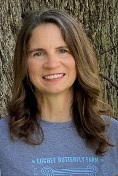
Jane Breckinridge
2024 NAPPC POLLINATOR ADVOCATE AWARD – United States
Jane Breckinridge, is a citizen of the Muscogee Creek Nation, Co-Director of the Tribal Alliance for Pollinators and Director of the Euchee Butterfly Farm in Tulsa County, OK. A new nonprofit, the Tribal Alliance for Pollinators (TAP) provides training and technical support for tribes throughout North America that want to conserve and restore grassland ecosystems in order to help threatened pollinators (like the monarch butterfly) and to preserve native plants that serve as the foundation for Indigenous cultural, medicinal, and culinary traditions. TAP was born out of the grassroots support generated by the Tribal Environmental Action for Monarchs (TEAM), a coalition of seven tribal partners – Chickasaw, Seminole, Citizen Potawatomi, Muscogee Creek, Osage, Eastern Shawnee, and Miami Nations – who are restoring monarch habitat on their lands with the assistance of Monarch Watch and the Jane’s own Euchee Butterfly farm. Together, the TEAM coalition has restored over 50,000 milkweeds and 30,000 native wildflowers to date on 350 acres of habitat.
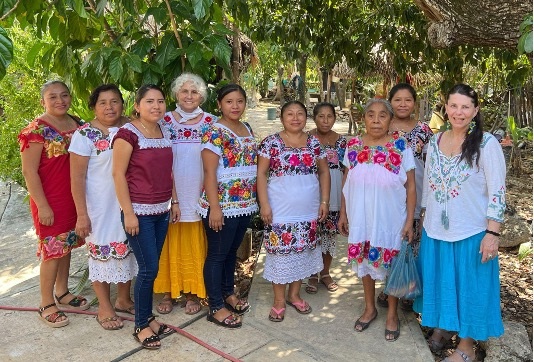
Mayan Melipona Bee Sanctuary Project
2024 POLLINATOR ADVOCATE AWARD- Mexico
Led by Rebecca Robertson, the Mayan Melipona Bee Sanctuary Project is a multifaceted initiative dedicated to empowering women, protecting and increasing the native endangered Mayan Melipona Honeybee, and preserving ancient Mayan culture. Located in Valladolid, in the heart of the Yucatán Peninsula, the Mayan Melipona Bee Sanctuary Project is committed to cultural preservation, gender equality, and ecological sustainability in the Yucatán Peninsula and beyond. Namely, the initiative seeks to achieve the protection and continuation of the more than 3200-year-old tradition of Mayan Melipona bee tending. Through this project, Rebecca and her team provide women with the necessary resources, knowledge, and support to start their own bee apiaries. In just a few short years, the Project has built a Central Bee Sanctuary in Valladolid, Mexico that is housing 50 hives of the native Stingless Melipona honeybee and additionally built seven bee yards in the surrounding Maya communities. The Project has trained approximately 100 Maya people in beekeeping practices that are lost in many villages and in doing so, they hope to create a pollination corridor for these bees, who are the crucial pollinators of their native ecosystems.
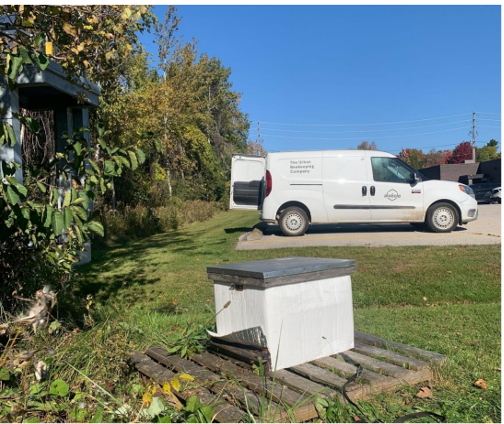
LANXESS Canada Co./Cie.
2024 POLLINATOR ADVOCATE AWARD - Canada
For over 60 years, the Lanxess West Hill Manufacturing facility has been operating in Toronto. The plant operates 24/7/365, employs over 100 employees and maintenance contractors, and produces lubricant additives and greases for specialty industrial and transportation applications. The site where the facility sits encompasses 24 acres of forest with urban wildlife, and the team at Lanxess has embraced the surrounding ecosystem and have become highly engaged in habitat restoration, involved with local environmental activities and causes, and implemented a community outreach and education program. The facility’s employees are awarded paid time off to participate in efforts like repatriating 1,500 square feet of lawn and converting it to a pollinator garden complete with native wildflowers, trees, and shrubs. The team at Lanxess have worked with local partners to install and maintain honeybee hives on site, and have gone beyond passively supporting these hives by implementing biomonitoring systems, reducing or in some cases eliminating mowing regimes, consulting with local biodiversity experts, and installing native bee and bird houses. These activities have inspired other Lanxess plants around the world to adopt similar practices, and have provided an example for how manufacturing facilities can achieve successful pollinator advocacy.
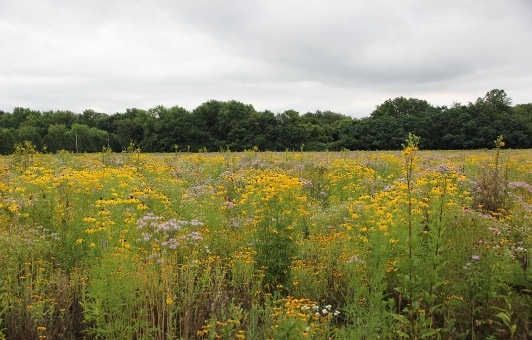
Baugh Farms
2024 FARMER AND RANCHER AWARD - United States
John and Barbara Baugh own and operate Baugh Farms, a corn and soybean operation in Tippecanoe County, Indiana. In 2017, John sought assistance from local NRCS/FSA representatives and the nearby soil and water conservation district regarding various erosion issues that were increasingly apparent in their row crop fields. After learning more about the various options they had to address the issue and motivated by a passion for pollinators and other wildlife, Barbara and John decided to convert the entire field of 99 acres to native prairie. Since then, the site has been utilized by the Tippecanoe County Soil and Water Conservation District as a stop on their wildlife habitat driving tour, which has allowed the public to learn more about local options for creating working habitat on private lands. Researchers from Purdue University have used Baugh Farms to conduct studies in to native pollinator populations and site prep methods, and the farm served as the example site for the Indiana Native Plant Society’s presentation entitled “Using Native Plants in a Modern Farming Operation”. Through their embrace of pollinator conservation and sustainable agricultural practices, John and Barbara are demonstrating the important linkage between working lands and functional habitats for pollinators and other wildlife.
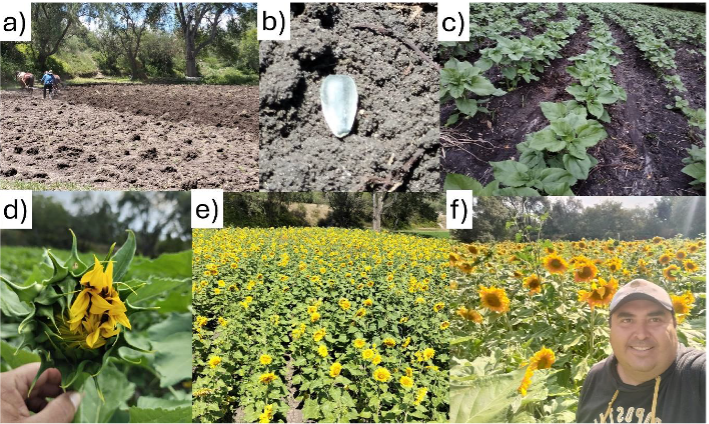
Ciro Arturo Reyes Moreno
2024 FARMER AND RANCHER AWARD - Mexico
Ciro Arturo Reyes Moreno is general manager of Rancho Los Álamos located in the municipality of Tula de Allende in the State of Hidalgo, Mexico. Rancho Los Álamos is an ecotourism project focused on the conservation and sustainable use of local flora and fauna. Much of its surface has been allocated for the conservation of pollinators through the planting of 90,000 sunflowers each year on 5,000 square meters, which, together with surrounding alfalfa fields, have contributed floral resources and shelter to fireflies and various types of pollinators such as bees, hummingbirds, bats, and other wildlife. By family custom, corn, pumpkin, beans, chili, and alfalfa are planted in these lands, and sheep, cattle and pigs are kept there as well. Currently, these activities are accompanied by various ecotourism services offered so that visitors can get a glimpse of how biodiversity can be supported alongside a thriving agricultural operation.
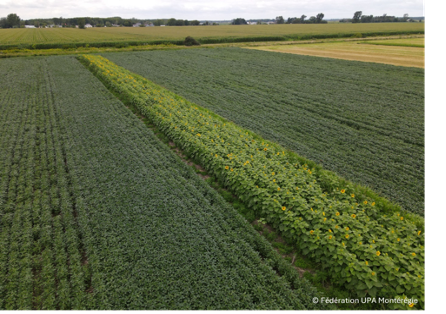
Céréales Bellevue Inc.
2024 FARMER AND RANCHER AWARD - Canada
Paul Caplette, and his brother Pierre own Céréales Bellevue Inc., a field crop operation in St. Robert, Quebec, roughly one hour north-east of Montreal. Having grown up on the farm, the two brothers know every detail and inch of the surrounding landscape, prompting a shared passion for the land itself and the surrounding ecosystems and wildlife. Céréales Bellevue Inc. has planted 1,200 trees and 5,000 fruit bushes to provide habitat and sustenance to native fauna and pollinators, and they cover 90% of their soil before each winter to better nourish and protect soil microorganisms. By widening their riparian buffer strips to more than 10 meters, whereas Quebec regulations require only 3 meters, Paul Caplette has created buffer zones and additional pollinator plantings between rows and along the waterways, and by the same token, have created refuge zones for biodiversity. These practices have helped Céréales Bellevue reduce GHG emissions by 33% and pesticide use by over 30% since 2006. Their unique system of dynamic, diversified cultivation enables them to have a high-yield rotational farming operation that prioritizes the health of pollinators and other surrounding wildlife.
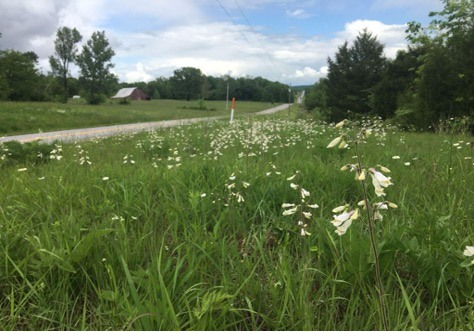
Kentucky Transportation Cabinet
2024 NAPPC ROADSIDE MANAGEMENT AWARD
Lead by the Kentucky Transportation Cabinet (KYTC) in partnership with Federal Highways Administration (FHWA), and United States Fish and Wildlife Service – Kentucky Field Office (USFWS-KFO), the 2019 KYTC Pollinator Conservation Strategy has been a shining example of the opportunities for pollinator conservation that exist along our federal and state ROWs. At this point in time, over 100 acres of pollinator habitat has been created so far within KYTC right-of-ways. With over 27,500 miles of roadway and 23 rest areas across Kentucky, it is KYTC's intent to utilize ROWs for pollinator habitat wherever possible within these areas. Species are selected mainly by their historical native presence in Kentucky and by site quality. In these pollinator plots, native species to Kentucky have been given preference, particularly milkweed given its importance to the eastern migratory monarch population. Public outreach has been a key priority for the KYTC, with regular signage along Kentucky’s ROWs pointing out habitat plantings to travelers, and through the use of social media, which has marked the KYTC’s shift in policy and increased the attention to the functionality of these new pollinator habitat plots. Of course, there are also the benefits to drivers through the beautification of Kentucky highways. With the creation of more pollinator habitat, KYTC is contributing to the stabilization of our pollinator populations.

Tennessee Valley Authority
2024 NAPPC ELECTRIC POWER AWARD
Led and administered by the Tennessee Valley Authority (TVA), the Douglas Dam Reservation Pollinator Project began in 2016 with the aim of a broadscale restoration of the grassland plant community at the project’s site on the French Broad River in East Tennessee. The project has followed a phased approach that varies across sections and is based on historic use, proximity to TVA’s assets, and the availability of existing seed banks for plant sourcing. At this point in time, about 60% of the total project area has been restored with native wildflowers and grasses and has officially reached the “maintenance stage”, wherein prescribed fire and Integrated Vegetation Management will be utilized. Given the successes of the Douglas Dam’s restoration project, TVA has become an active participant in the Southeast Bumble Bee Atlas regional project and the site has been utilized by University of Tennessee masters students for their theses and five peer-reviewed publications. Direct outreach about the project and the intended maintenance methods has been conducted, along with the publication of an annual TVA Stewardship Book in which the Douglas Dam site is regularly featured. TVA has embraced the influence of NAPPC and the growing awareness of pollinators amongst the general public, as the Douglas Dam site was featured during Pollinator Week outreach events in collaboration with several University of Tennessee campuses and their Pollinator Week activities.
2023 Pollinator Award Winners
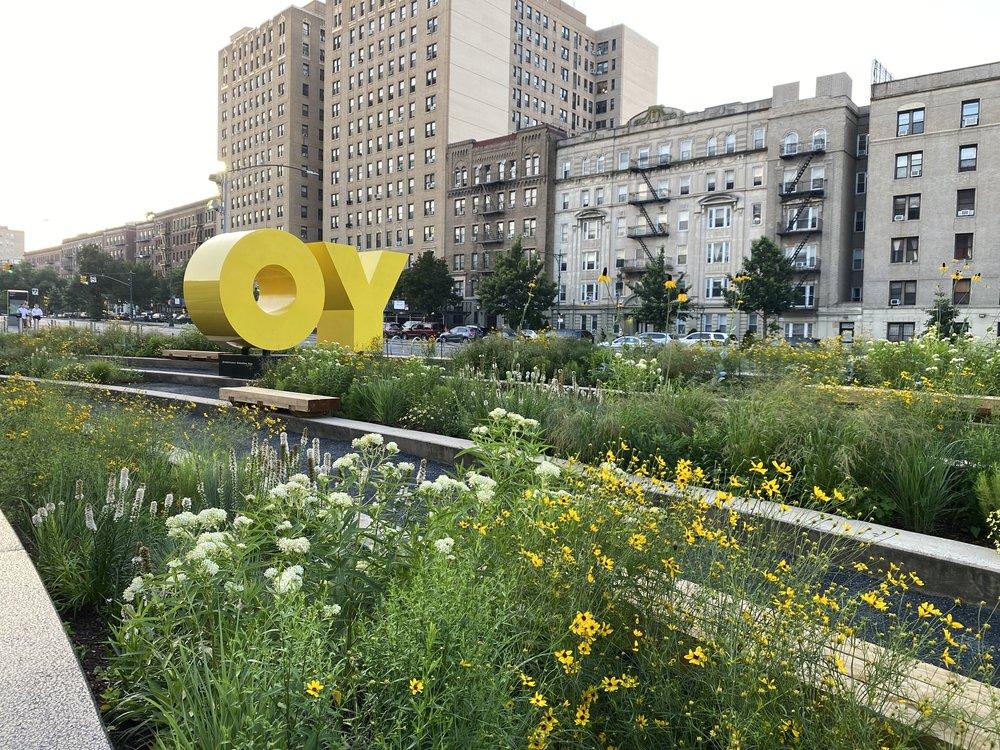
Rebecca McMackin
2023 NAPPC POLLINATOR ADVOCATE AWARD - United States
Rebecca McMackin of the Brooklyn Bridge Park and Harvard University is a biologist and landscape designer with a M.Sc. in Biology from the University of Victoria and a M.Sc. in Landscape Design from Columbia University. She grew up on a farm in Connecticut and moved to Brooklyn at the age of 30 to work for NYC Parks. After working as head gardener at Washington Square Park, she became the Director of Horticulture at Brooklyn Bridge Park soon after it opened in 2010 and remained in that role until she was recently awarded the Harvard Loeb Fellowship. One of Ms. McMackin's most tangible and practical contributions is the transformation of Brooklyn Bridge Park under her leadership. To quote Lisa Collins of the New York Times: “Under Ms. McMackin’s direction, the park, built on East River piers, is now home to a growing population of rare bees, moths, pollinating flies, butterflies and birds." Ms. McMackin shares her knowledge of pollinators and pollination ecology with anyone who is interested. She has taught classes at the Brooklyn Botanic Garden and the New York Botanical Garden and written for the New York Times, the Landscape Institute, and the Ecological Landscape Alliance. Her work has been featured on PBS’s Garden Smart, Margaret Roach’s A Way to Garden, and Jennifer Jewel’s Cultivating Place. Her outreach includes being available to local organizations, sharing educational materials on social media, and publishing free online lectures on her website.
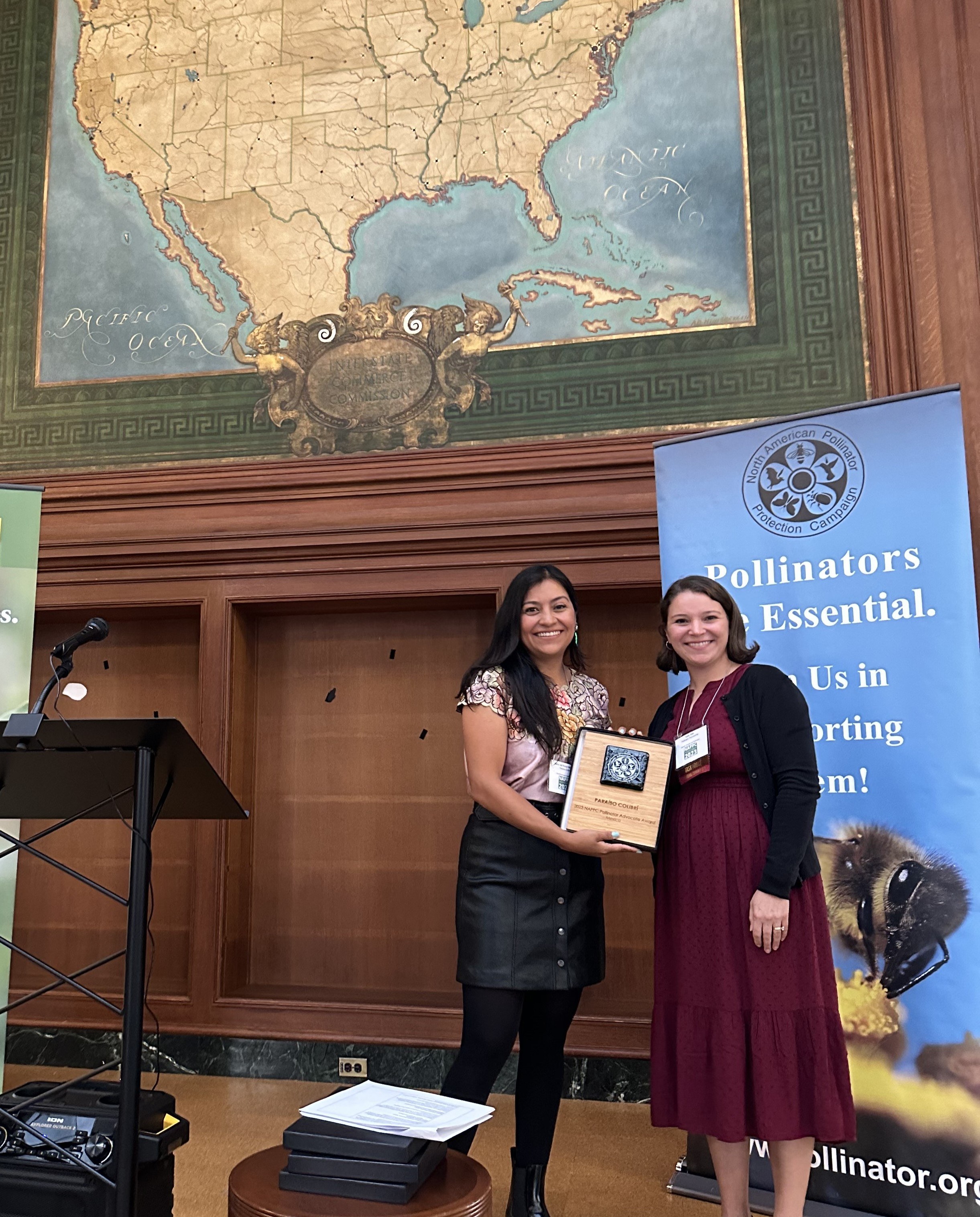
Maria del Rocío Meneses Ramirez, Paraíso Colibrí
2023 NAPPC POLLINATOR ADVOCATE – Mexico
Led by Maria del Rocío Meneses Ramirez, Paraíso Colibrí is an organization focused on the propagation and divulgation of native pollinator plants. Based in Puebla, México, Paraíso Colibrí started in 2016 out of a need to supply the lacking market for native Mexican plants that offer food resources to hummingbirds and other pollinators in urban areas. Paraíso Colibrí became the first nursery specializing in producing pollinator plants in México. Paraíso Colibrí also oversees an educational initiative that helps to spread awareness of pollinator importance, biodiversity green areas, and transform urban spaces into green places that offer native habitats for pollinators. Paraíso Colibrí offers workshops and talks to public and private institutions, such as schools and industries, working with kids, young, and adults. The organization also collaborates with other groups and governmental institutions to train new producers and landscapers for producing and using native plants in urban green spaces. The stated purpose of Paraiso Colibrí is to contribute to creating resilient cities for pollinators and sharing our knowledge about pollinator plants with others.
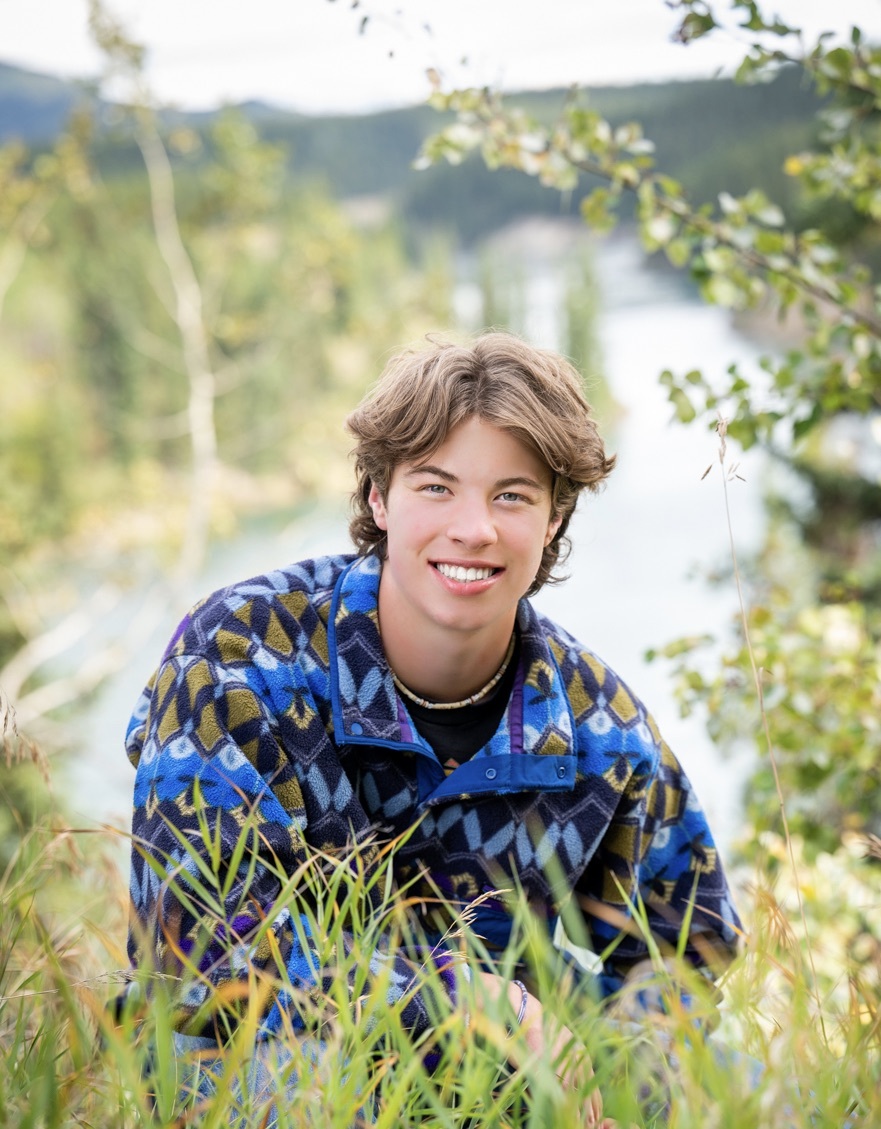
Evan Howells
2023 NAPPC POLLINATOR ADVOCATE - Canada
Evan Howells is a 16-year old student from Whitehorse, Yukon who has always had an appreciation for nature and insects, especially bees! Evan conducted the first study comparing the pollen foraging patterns of native bumble bees and non-native honey bees in natural landscapes in Southern Lakes, Yukon. His study findings showed the bees’ choices were similar for their most frequently-chosen pollen types, but bumble bees collected more diverse pollen than honey bees on each foraging trip. This information will help guide further management practices (e.g., beekeeping, landscaping) to maintain native bumble bee populations on a local scale and raise awareness of their needs. Evan presented his study at the Yukon Regional Science Fair in 2023, winning the Commissioner’s Award for Best Project in Fair and was honored in May 2023 with a bronze medal in the senior category of the Canada Wide Science Fair. Evan presented his study to the City of Whitehorse Parks Department to encourage them to become a Bee City, demonstrating a commitment to conservation and awareness of native pollinators. Evan was successful at encouraging the City of Whitehorse to plant bee friendly gardens and planter boxes this past summer with a diversity of Yukon native flowers to bloom at different times throughout the season. He also asked them to consider the needs of native bumble bees when developing guidelines for management and placement of honey bee hives in the City. To raise awareness about Pollinator Week, Evan created a bee-friendly fact sheet to encourage planting of Yukon native flowers by residents and promote websites such as Bee City Canada.
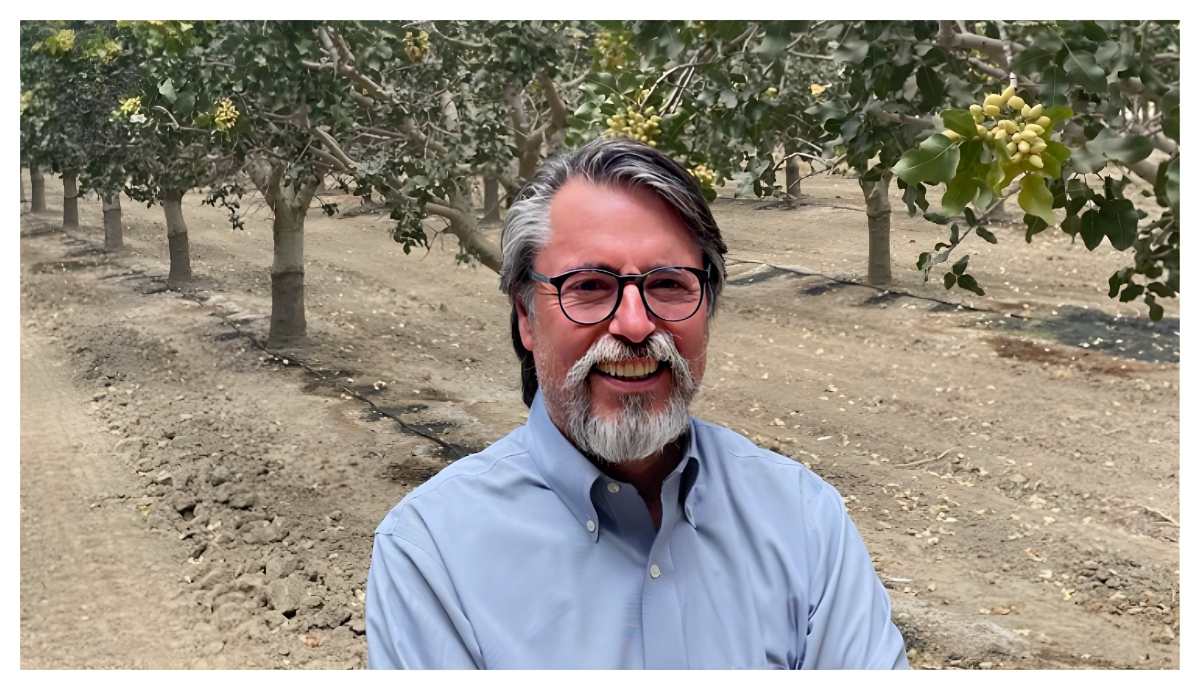
Stuart Woolf - Woolf Farming
2023 NAPPC FARMER RANCHER AWARD - United States
Stuart Woolf at Woolf Farming has gone above and beyond to support pollinators in their operations. Stuart has served as Chairman of the California League of Food Processors, the Almond Board of California, and on the UC President’s Commission of Agriculture and Natural Resources. Stuart currently serves on the board of the California Chamber of Commerce, Western Growers Association and Marrone Bio Innovations. Woolf Farming manages over 7,500 acres of almonds, along with thousands of acres of other crops, in the Central Valley of California. Their operations have quickly adopted pollinator friendly practices and this effort has been led by Stuart, demonstrating by example that farming and conservation go hand in hand. Under the direction of Stuart, Woolf Farming has planted over 550 acres of forage and habitat for pollinators. This included both cover crops and perennial native plants. They have implemented Integrated Pest Management across all orchards, including the use of mating disruption and other non-chemical intervention methods, directly benefiting pollinators by reducing pesticide exposure. This work involved dramatically changing the way they organized their 0perations, from removing land to act as set aside habitat, to managing cover crop within the orchards to maximize their benefits to pollinators without impacting their operations. Stuart led the charge in the internal conversation within their operations to incorporate pollinators in many of the decisions being made in their fields. He has continued to provide resources and time for both himself and his staff to have this conversation with their partners and agriculture at large. This has extended to partnering with P2 and providing valuable insight and resources to continue creating change and generating awareness about pollinators in agriculture. These farms also hold Bee Friendly Farming certification.
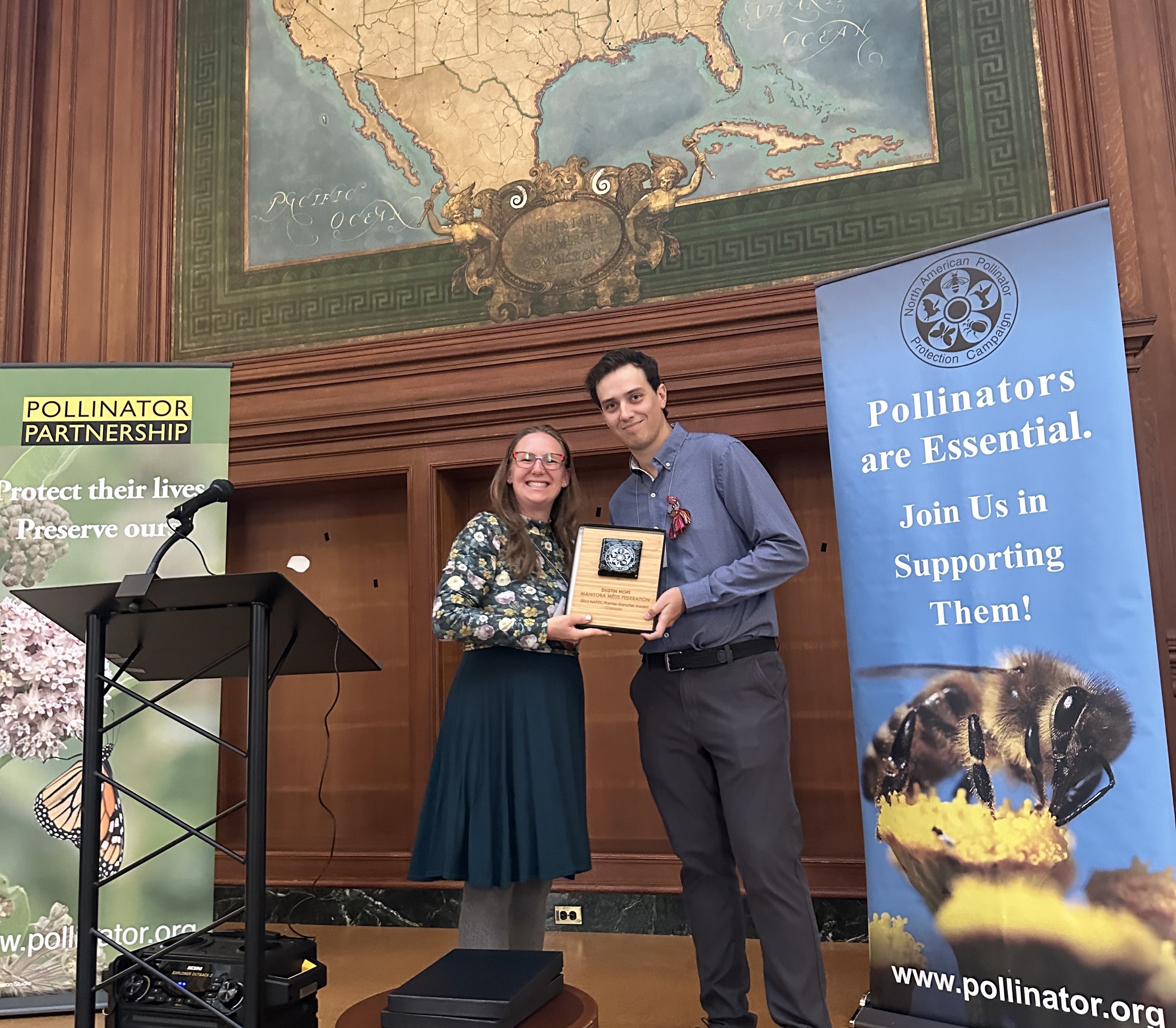
Dustin Hoft - Manitoba Métis Federation
2023 NAPPC FARMER RANCHER AWARD - Canada
In his role as Agriculture Coordinator for the Manitoba Métis Federation, Dustin Hoft contributes to pollinator protection and conservation efforts through education, advocacy, and research. In this role, he has in 2022-2023 secured over $7.2 million to support Red River Métis agricultural producers adopt and implement new on-farm beneficial management practices. Dustin promotes and advances Indigenous agricultural lands conservation and provides a new vision for managing agricultural lands by enhancing conservation on large and small agricultural lands, protecting them from degradation and outdated intensive agricultural practices. In 2022, Dustin led the site planning and coordination of a historical site garden, in which over 40 heirloom varieties of vegetables, fruits, and herbs were planted producing 1000 pounds of food distributed to Elder and Citizens in-need. Milkweed was also highlighted as an important feature of the garden when tours were provided. Dustin is working to expand the horizon of what is possible, by striving for Indigenous-led agricultural research projects and developing partnerships with academic institutions, developing innovative Bison Rematriation projects, Three-Sister Planting Research, adopting and implementing beneficial management practices, food as medicine research, supporting food security, and addressing systemic inequalities for Indigenous recognition and participation through Traditional Knowledge sharing and the advocating of a two-eyed seeing approach which integrates both western and traditional Métis practices.
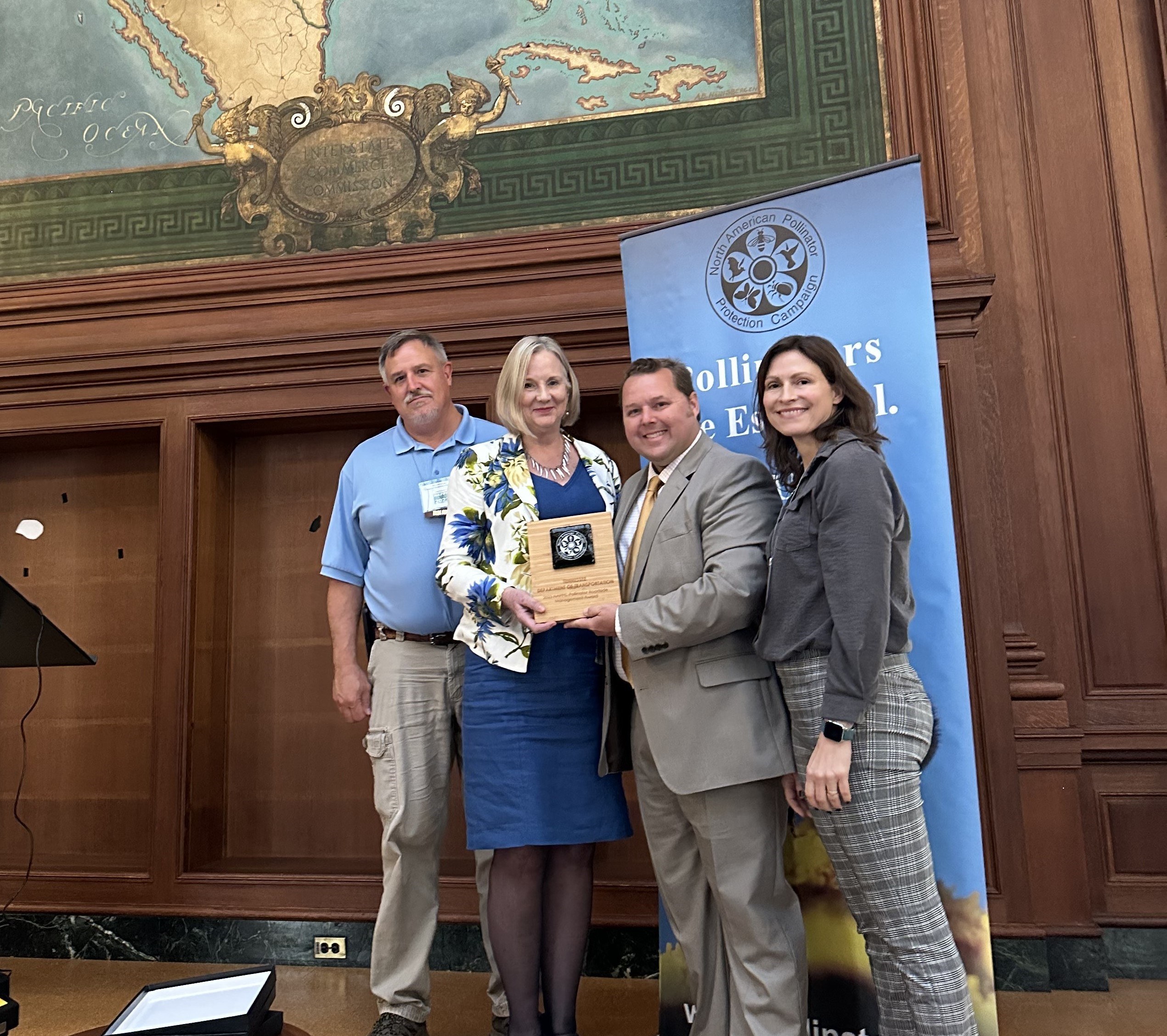
Tennessee Department of Transportation
2023 NAPPC ROADSIDE MANAGEMENT AWARD
Since 2010, the Tennessee Department of Transportation (TDOT) Pollinator Habitat Program has been committed to promoting the growth, preservation, and conservation of pollinators throughout Tennessee. This initiative achieves its goals through various means such as education, partnerships, and environmentally sound practices. In 2010, the program introduced Integrated Mowing Practices to enhance pollinator habitats and in 2016, TDOT 0.5-acre pollinator meadow and the installation of interpretive materials at Welcome Center I-65 Ardmore exit in Giles County. Recognizing the importance of collaboration, TDOT formed the Partners for Pollinators Working Group. In 2020, TDOT completed the second Welcome Center pollinator meadow, spanning 2.5 acres at the West TN Solar Farm Welcome Center. Situated along the highway, this meadow features educational signage and attracts approximately 300,000 visitors annually. To assist designers, academics, and the general public, TDOT developed the Tennessee Pollinator Plant Database Tool and Map in 2021. This resource provides valuable information for selecting appropriate pollinator-friendly plants. In 2022, TDOT introduced "Polli- The Bee from Tennessee!" The program aligns with Tennessee's K-12 academic standards for science and aims to promote pollinator education. Recently, in 2023, TDOT unveiled Project Milkweed, a response to the declining Monarch Butterfly population. As part of this project, TDOT offers free milkweed seeds to anyone in Tennessee, along with planting design and installation guidelines. Overall, the TDOT Pollinator Habitat Program's initiatives have multiple positive impacts, including the provision of vital wildlife habitat, the creation of habitat connectivity, and the enhancement of people's experiences and understanding of pollinators.
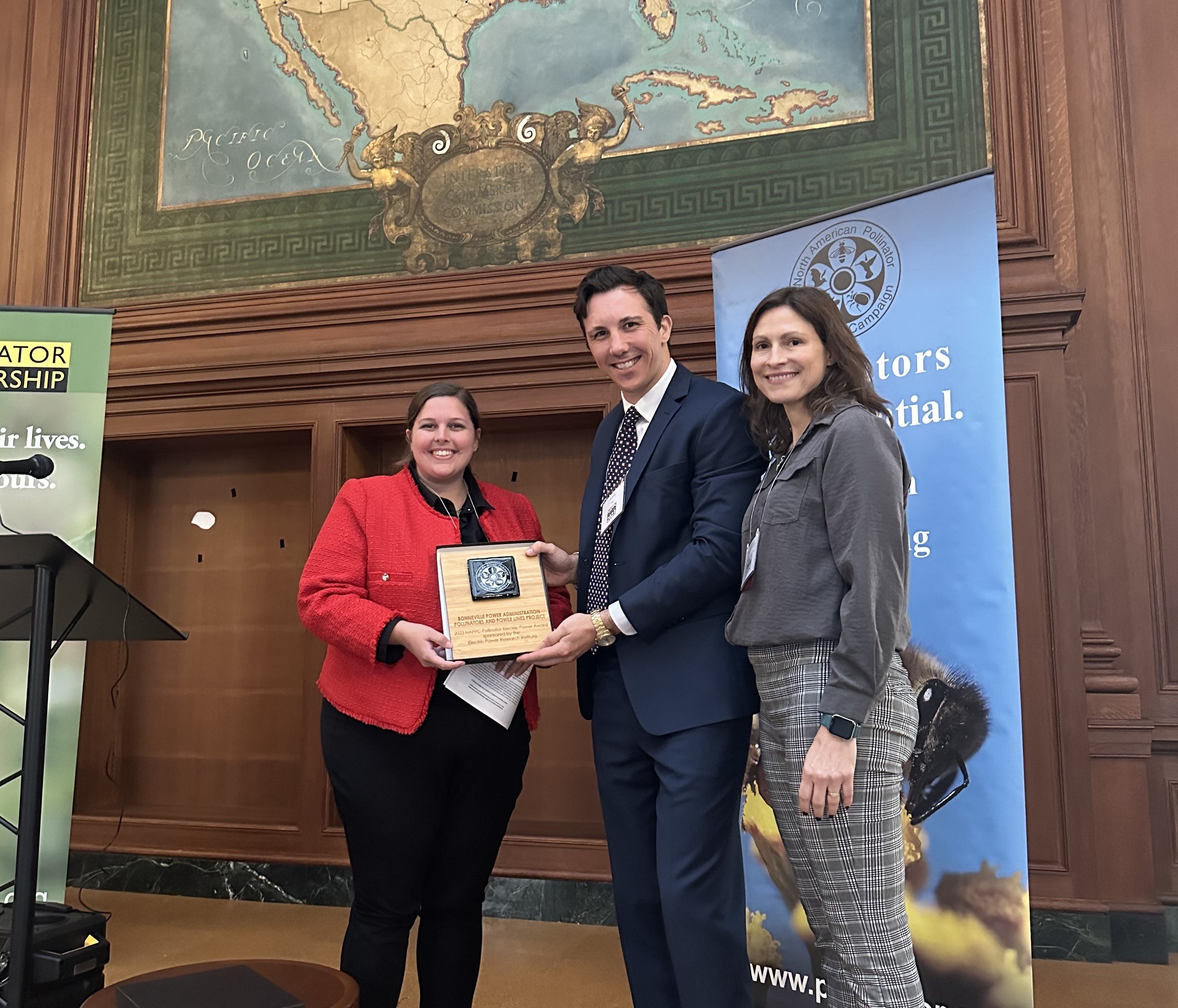
Bonneville Power Administration
2023 NAPPC POLLINATOR ELECTRIC POWER AWARD
Bonneville Power Administration (BPA) owns and maintains several miles of high-voltage transmission lines that pass through the heart of Forest Park, a 5,200 acre park in Portland, Oregon. BPA and Portland General Electric (PGE) maintain the vegetation along these rights-of-way (ROWs) according to agency and company requirements for safety and access, and in partnership and cooperation with Portland Parks and Recreation (PP&R). These ROWs provide some of the only open habitat in the park and provide important foraging resources and habitat connectivity for pollinators. To improve the ecosystem function of BPA ROWs, BPA partnered with METRO (a regional governance agency) and Portland Parks and Recreation on a restoration project to specifically improve pollinator habitat within several sections of its ROW. Project goals include the following: collaborating with local partners to determine whether and how habitat improvement strategies could be implemented in transmission line ROWs, evaluating the benefits of habitat improvements through monitoring, and developing a strategy for future work. In fall 2019, three “showcase spots” of about 800 sq. ft. each were installed in the project area by PP&R to generate interest and excitement in park visitors, and to highlight the beauty of Oregon’s prairie wildflowers that can provide pollinator and other wildlife habitat in a home garden. The locations were chosen specifically for their close proximity to trails and points of access where visitor interaction would be guaranteed. A monitoring project conducted with the Xerces Society found that pollinators are responding well to the project. A growing gap was observed between the pollinator communities supported in the BPA ROWs compared to the status quo Portland General Electric ROWs, considering natural variation in annual pollinator abundance. Significantly, the pollinator community in the BPA ROWs showed a response to restoration by increasing the proportion of native plants they visited through time. There was also some evidence that the BPA ROW was able to support more butterflies and higher butterfly richness than the PGE ROW. These findings will allow Portland General Electric to evaluate maintenance needs and methods (in partnership with BPA), and determine if additional seeding or other planting is needed to maintain the goals of the project.
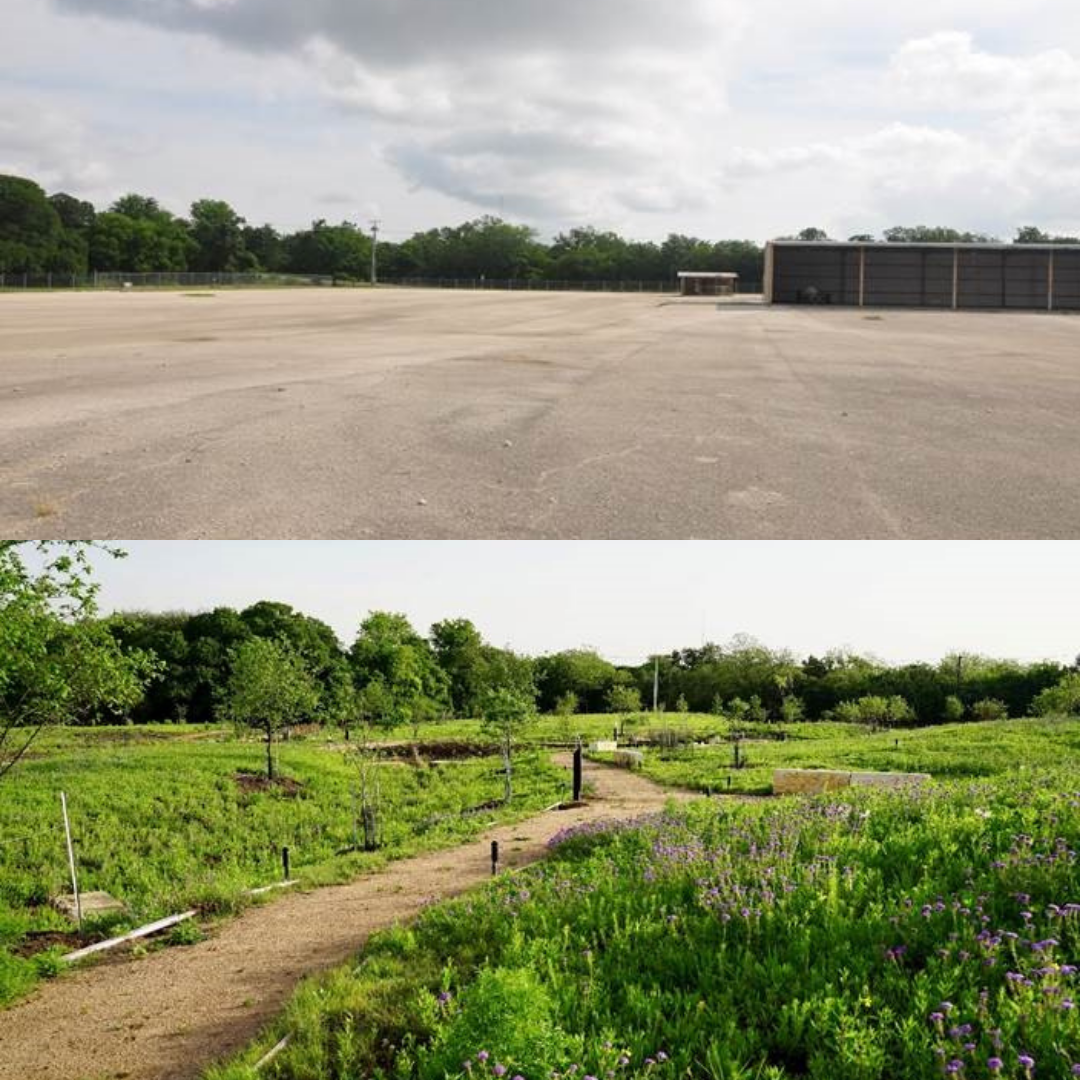
Headwaters at the Comal
2023 NAPPC POLLINATOR ELECTRIC POWER AWARD – Runner Up
The mission of the Headwaters at the Comal (the Headwaters) is to strengthen the relationship between the community and nature by showcasing the significance of the Comal Springs. The Comal River is the heart and soul of the New Braunfels area, and for thousands of years it has been an important gathering place for people. The River and the springs that feed it are core to the identity of the New Braunfels community and are a critical natural resource for the region. To ensure the conservation of this natural resource, the New Braunfels Utilities (NBU) established the Headwaters at the Comal in 2017, and together, work to inspire the lifelong practice of experiencing, enjoying, and stewarding the cultural, ecological, and community resources that have made New Braunfels and the Hill Country region a special place to live. In partnership with NBU, and with strong support from the community, the Headwaters is leading a grand metamorphosis; the complete transformation of a 16-acre site from an old utility facilities property that sits at the headwaters of the Comal River into the Hill Country’s premier education and community center. The Headwaters engages the hearts and minds of thousands of central Texas youth, business leaders, and community members in the conservation and stewardship of our beloved springs and rivers through programs that stretch across our four organizational pillars: education and demonstration, research, conservation, and community placemaking. To monitor the native plant and pollinator species in the area, the Headwaters at the Comal participates in the Texas Butterfly Monitoring Network and organizers created the Headwaters at the Comal iNaturalist Project in which volunteers collects all plant, animal, insect, fungi, etc. observations through the iNaturalist app.
2022 Pollinator Award Winners
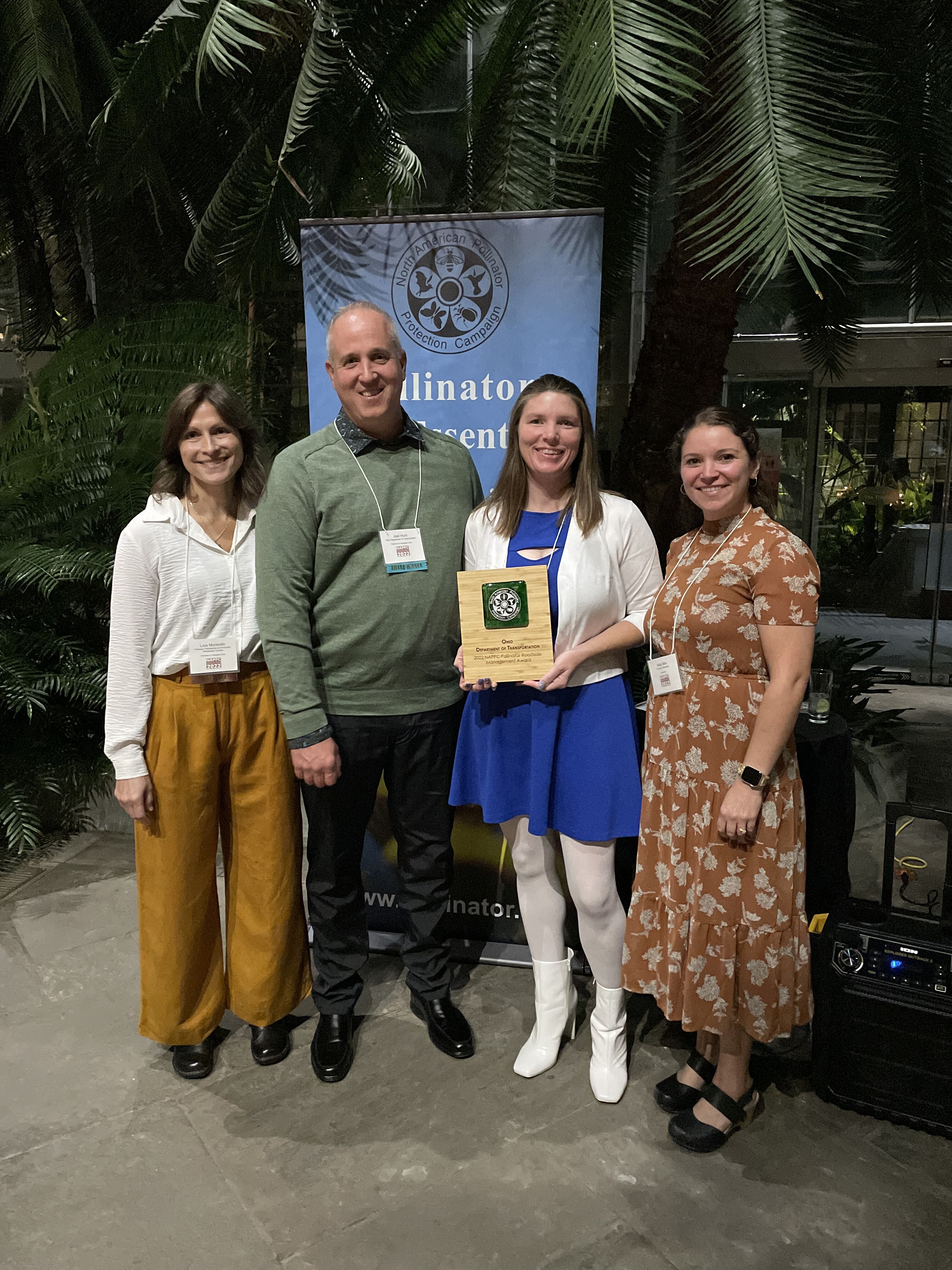
OHIO DEPARTMENT OF TRANSPORTATION
2022 POLLINATOR ROADSIDE AWARD
The Ohio Department of Transportation, (ODOT) planted wildflower sites across the state purely for aesthetics in the 1990s. The Department realized the practice was not sustainable in its current form and discontinued the practice. In 2011, ODOT was approached by the Ohio Department of Natural Resource’s Division of Wildlife and Pheasants Forever to install a sustainable prairie on the western edge of the state in Darke County. The planting was successful and with a subsequent test site focusing on plants that benefit pollinators and wildlife began ODOT’s pollinator habitat effort. With minor adjustments to its seed mixture, the Department determined a prairie could be created that would meet the needs of both initiatives, which greatly increased the number of public-private partners. In 2016, ODOT created a fully funded standalone Highway Beautification and Pollinator Habitat Program to capture the numerous opportunities available to enhance and establish pollinator habitat along the state’s 19,000 miles of roadside. The coordinator works with local, state and federal agencies, non- profit organizations and other partner organizations to plan and implement new roadside pollinator habitats.
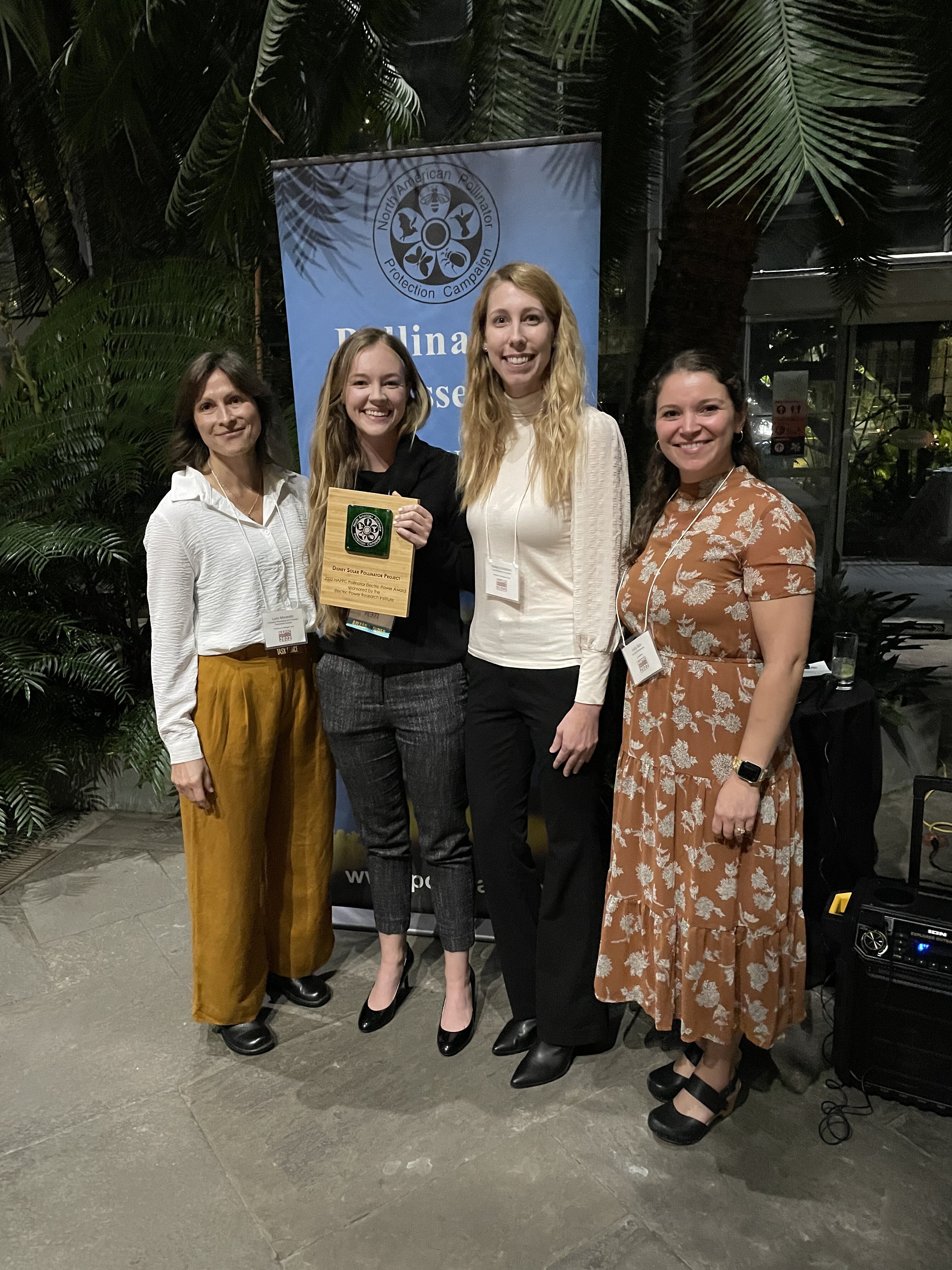
DISNEY SOLAR POLLINATOR PROJECT
2022 POLLINATOR ELECTRIC POWER AWARD
Disney set ambitious goals to drastically improve the sustainability and carbon footprint of company operations by 2020 including a 50% reduction of net emissions by 2020 from 2012 levels. To help achieve this goal, Disney worked with ORIGIS Energy USA, Duke Energy, Reedy Creek Improvement District, and Reedy Creek Energy Services to bring two solar facilities online, which offsets enough electricity to operate two out of the four Disney theme parks in Orlando. However, the story does not stop at clean energy. In continued commitment to wildlife and conservation, teams from Disney Conservation, Origis Energy USA, Duke Energy, Reedy Creek Improvement District, Disney Horticulture, other contractors, and individual experts worked together to create pollinator-friendly habitat at the solar facilities. The project goal is to not only add conservation value for native pollinators and wildlife, but also to provide valuable research meadow. Disney’s current research aims are to continue to develop best management practices for long term habitat maintenance, to study solar habitat impacts on native bees, and to study how under-panel microclimate affects flowering phenology and abundance. This project allows us to lead and support other businesses in setting a new bar for industry standards and corporate conservation.
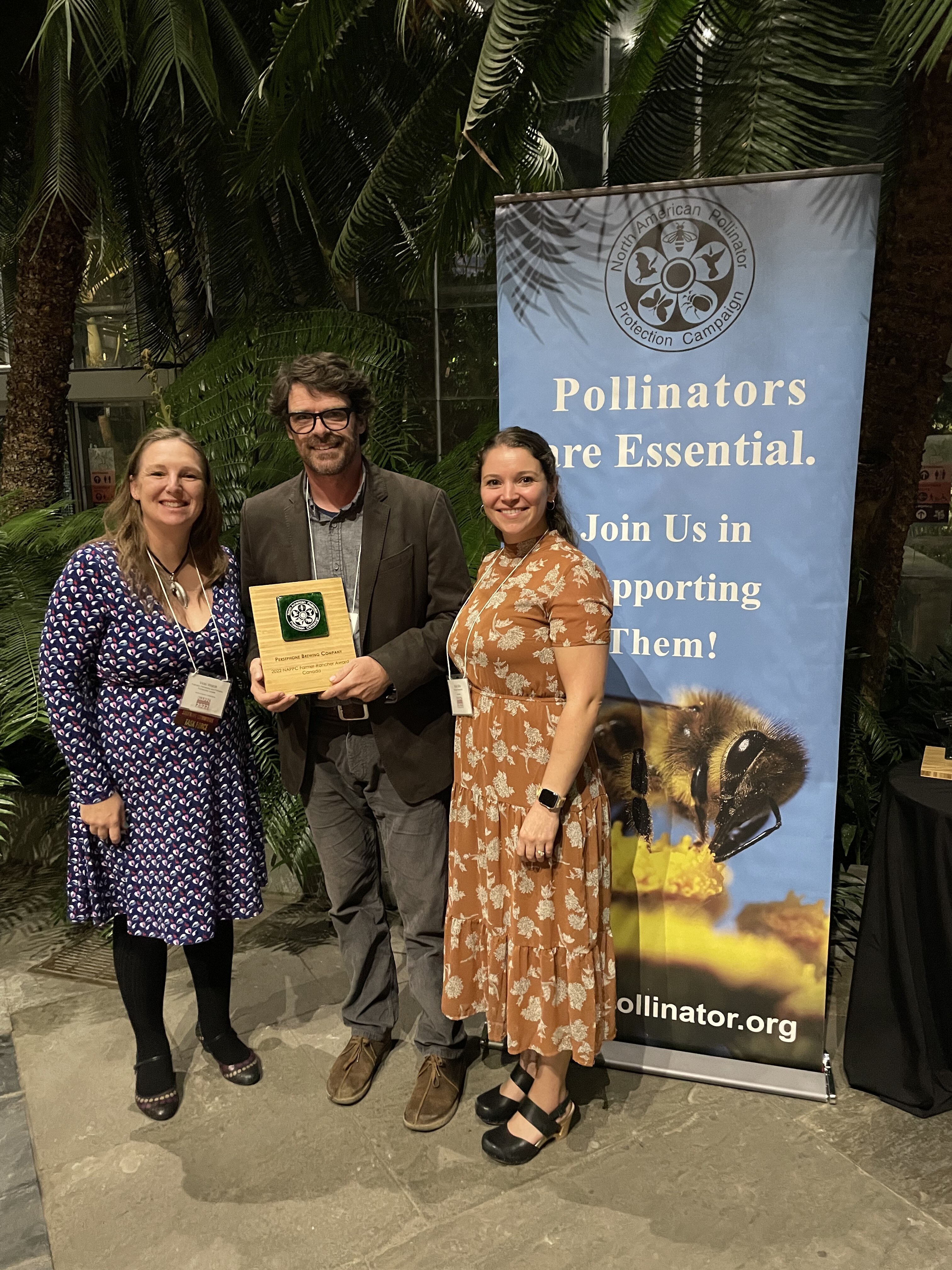
PERSEPHONE BREWING COMPANY
2022 FARMER-RANCHER POLLINATOR CONSERVATION AWARD CANADA
Persephone Brewing Company located in Gibsons, British Columbia makes sustainable brewing and local food security a priority when crafting their award-winning beers. Persephone is a certified B-Corporation and obtained their Bee Friendly Farming Certification from Pollinator Partnership. By becoming a Bee Friendly Farming member, Persephone helps preserve and protect the pollinator populations by implementing positive, incremental changes on our property.
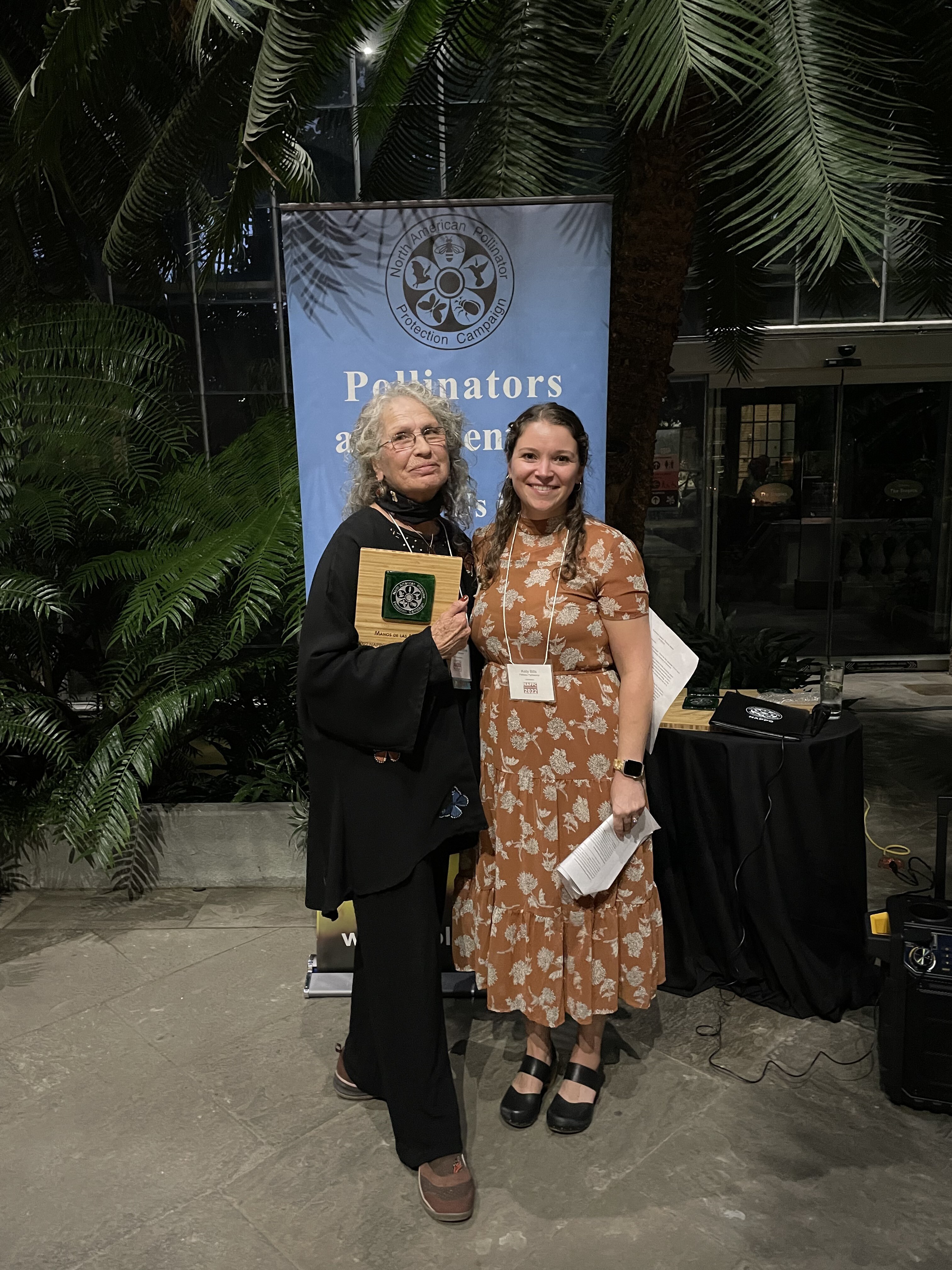
MARALEEN MANOS-JONES, MANOS DE LAS MARIPOSAS
2022 POLLINATOR ADVOCATE AWARD UNITED STATES
Maraleen Manos-Jones of Manos de las Mariposas has been contributing to pollinator conservation since 1972 when she brought home a monarch caterpillar and fed it milkweed that contained over 100 monarch eggs. Since then, Maraleen has traveled between Mexico and the United States to observe, protect, and spread awareness about migrating monarchs. She returned to Mexico almost yearly over the ensuing decades, working with the mountain women to sell their pine needle and other crafts and with a Mexican non-profit reforestation project where she helped facilitate the planting of over six million trees in and around the monarch sanctuaries. She is the author of sold-out book The Spirit of Butterflies: Myth, Magic & Art, published by Harry Abrams. As an educator with an M.A. in teaching, she has lectured nationally and in Canada addressing the importance of pollinators, the challenges they face from use of pesticides and climate change, always including positive actions individuals and communities can take to to help ameliorate the situation. She has brought her knowledge and passion to students at numerous schools, libraries, museums, universities, zoological parks and nature centers.
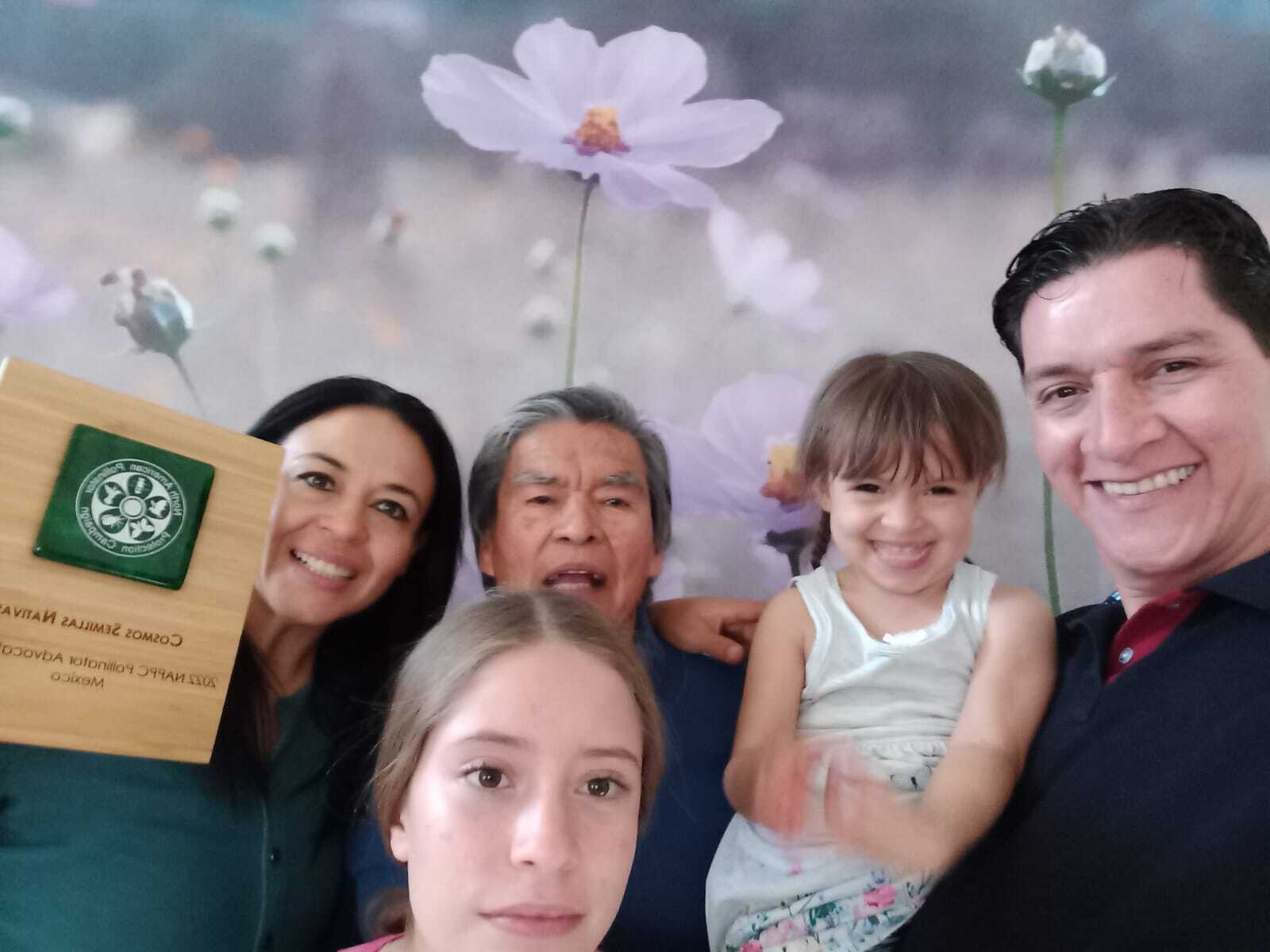
HECTOR AVILA, COSMOS SEMILLAS NATIVAS
2022 POLLINATOR ADVOCATE AWARD MEXICO
Hector Avila is a conservation biologist located in the state of Aguascalientes in central Mexico. After noticing the scarcity of native wildflower seed producers in Mexico, Hector founded Cosmos Semillas Nativas, the first native wildflower seed producer in the country. He is determined to make native wildflower seeds more available to food producers and the public for habitat restoration by participating in the development of the Mexico’s National Strategy for the Conservation and Sustainable Use of Pollinators. He is one of the founders of the conservation nonprofit organization ECOSISTEMICA, A.C., where he collaborated to create pollinator and Monarch butterfly gardens in four states of central Mexico (Aguascalientes, Guanajuato, Jalisco and Zacatecas), financed by the USFWS. He also participated in the design of a brochure on monarch butterfly and a guide on pollinator gardens.
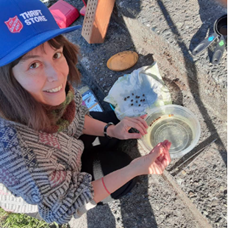
MYRIAM PARENT, WITHBLOOM POLLINATOR GARDENS
2022 POLLINATOR ADVOCATE AWARD CANADA
Myriam Parent is a professional musician and owner of Withbloom Pollinator Gardens, a business that specializes in education, consultations, and landscaping for indigenous plant and bee habitat on Lekwugen Territory. She is passionate about sharing her knowledge of pollinators and their associated native plants partners with her community. Myriam gets the people of Victoria, British Columbia excited about pollinator conservation by leading biweekly workshops on indigenous bees, educating participants on how to enhance bee habitat on their property. Her generous donations of time and compassion through workshops and the creation of numerous pollinator gardens has ripple effects throughout her community, catalyzing widespread public engagement and significant urban pollinator conservation.
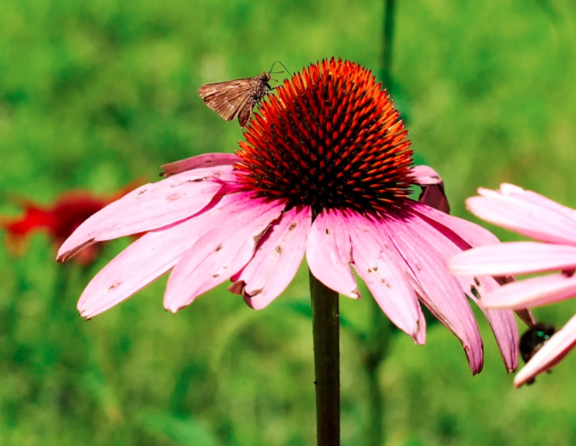
BAS ROUGE FARM AND FORGE
2022 FARMER-RANCHER POLLINATOR CONSERVATION AWARD UNITED STATES
Bas Rouge Farm and Forge is owned and operated by Glenn and Ivonne Vasquez of Victoria, British Columbia. Bas Rouge Farm and Forge began as a homestead and has grown into a diversified farm that fulfills their mission to encourage sustainable gardening. Their native plant nursery strives to educate visitors on the impact native plant communities has on sustaining vital pollinators in the region. Bas Rouge promotes the persistence of pollinator habitat through their several workshops centered around sustainable gardening and native plant sales. Their Native Plants for Pollinators gardening class educates attendants on the importance of native plants, shrubs, and trees on the lifecycle of significant pollinators such as bumblebees, small native bees, and fauna.
2021 Pollinator Award Winners
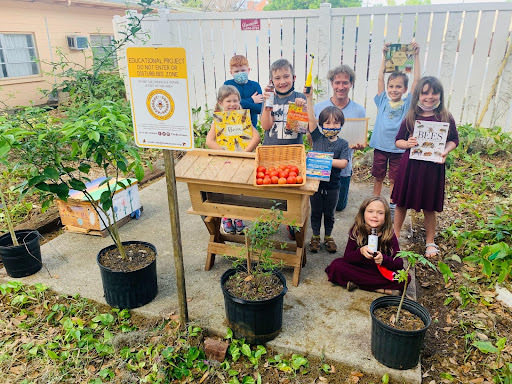
THE BEE CAUSE PROJECT
2021 NAPPC POLLINATOR ADVOCATE - UNITED STATES
The Bee Cause Project is a Charleston, SC based non-profit organization that works to engage students of all ages within their own environments through observation-based learning. Ted Dennard, a lifelong beekeeper and the founder of Savannah Bee Company, and Tami Enright, a fellow beekeeper and environmental educator, have dedicated their lives to protecting pollinators, founding The Bee Cause Project and securing a national partnership with the Whole Kids Foundation. The organization solicits honey bee grant and observation hive program receives hundreds of schools’ participation applications annually, and more than 550 schools and organizations have received bee grants to date, impacting thousands of children across North America. They have also introduced digital hives as an alternative for schools or community centers that cannot host a live beehive, and have just launched a Pollinator Garden Grant for Libraries. The organization’s goal is to be equally open and accessible to everyone, expanding their educational offerings to the Open Educational Resources Commons (OER). If a teacher is looking for a pollinator or bee-specific lesson that addresses the STEAM standards for their class, they can search it in OER and find free and printable versions of The Bee Cause project’s curricula.
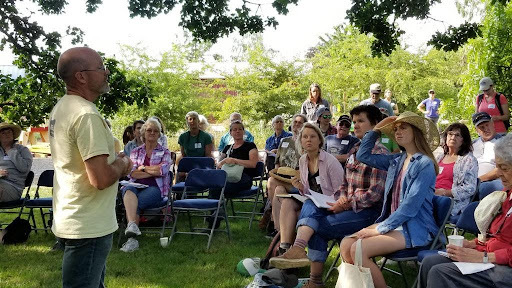
DAN AND MICHAEL O’LOUGHLIN
2021 NAPPC-NACD FARMER-RANCHER - UNITED STATES
Dan and Michael O’Loughlin operate a 200-acre farm in Yamhill County, OR that primarily grows tall fescue seed. There are few pollinator initiatives in Oregon that the O’Loughlins have not supported or helped, including having surveyed bees at over 1,500 locations for the Oregon Bee Atlas, having worked with the county to establish trials assessing roadside pollinator seed mixes, having created pollinator habitat at schools through the State School Garden Network, and having served as leaders in the State Pollinator Protection Initiative, the Oregon Bee Project. O’Loughlin Farm has also made major strides to increase insect biodiversity. The farm rarely uses insecticides owing to the high endemic populations of beneficial insects and vertebrates, and insectary plantings are key to this strategy. Many of the plants they use are important nectar and pollen sources and butterfly host plants. They have also created a 1/3 mile-long beetle bank that also serves as a Monarch Waystation. They have worked hard to enhance their riparian areas by planting key shrubs and trees; they rotate beneficial cover crops for pollinators; they maintain muddy ponds for social wasps; they have enhanced their woodlands by planting early blooming trees. Among other initiatives, the O’Loughlin brothers take their knowledge back to the community via a 100 person classroom in their barn equipped with dissecting microscopes. Michael alone has contributed over 2,500 hours to train volunteers in the Master Gardener program.
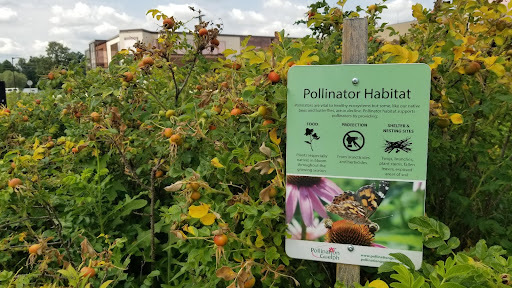
POLLINATION GUELPH
2021 NAPPC POLLINATOR ADVOCATE – CANADA
Pollination Guelph, founded in 2008, is an entirely volunteer-run charitable organization that focuses on protecting pollinator habitats by building and maintaining public and private gardens throughout Guelph, ON. Several notable projects include Eastview Pollinator Park, The Gosling Pollinator Gardens at Hospice Wellington, Trans Canada Trail Pollinator Gardens, and Clair Road Emergency Services Centre Pollinator Habitat Meadow. In addition to on-the-ground work, Pollination Guelph reaches out to its diverse audience with numerous education initiatives and advocacy campaigns through their website in the form of videos, web links, downloads, factsheets, and newsletters on a wide range of topics. The organization also hosts an annual symposium featuring workshops and networking opportunities that is attended by people from all over Canada. In addition, their Community Grant program enables other nonprofit groups in Guelph to establish and maintain pollinator habitat. In 2021, this program provided a total of $10,000 to 16 local organizations.
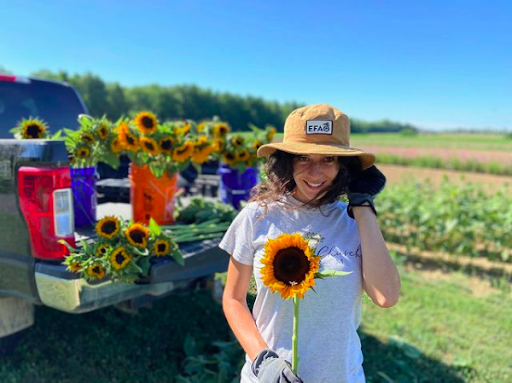
SHANNON MCNALLY
2021 NAPPC FARMER-RANCHER – CANADA
Shannon McNally of White Church Farm manages over 33 hectares for pollinators in Mount Hope, ON. Once a monocrop corn and soy farm, Shannon has been hard at work planning for long term biodiversity. Each year, she tries to restore areas by planting permanent, native species including 30 trees, acres of permanent pasture, and hundreds of perennial wildflowers last year alone. She has also planted over 5 acres in permanent, mixed bee forage, created clover pathways around the farm, cultivated diverse, mature tree lines and hedgerows, and recently established a 2-acre permaculture orchard. Each year, the farm grows a succession of sunflower fields for bee forage and bird seed and plants cover crop for pollinators. In the coming year, Shannon plans to restore a riparian area with native trees and shrubs as well as install a monarch focused garden featuring three milkweed species.
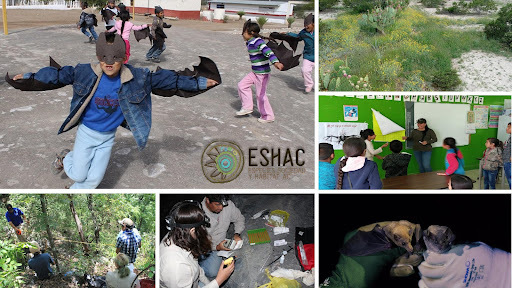
ESPECIES, SOCIEDAD Y HABITAT, A.C.
2021 NAPPC POLLINATOR ADVOCATE – MEXICO
Especies, Sociedad y Habitat, A.C. (ESHAC) is a nonprofit organization that uses a human community-centered approach to implement projects that promote the conservation of natural resources and endangered species while promoting sustainable use of biodiversity. ESHAC has implemented more than 30 projects in northeast Mexico, impacting more than 30,000 hectares of priority area for conservation in the region. Over the last five years, ESHAC has been collaborating closely with Don Martin-CONANP to promote the conservation of the Mexican long-nosed bat (Leptonycteris nivalis), with special emphasis on protecting cave roosts and enhancing foraging habitat along their migratory corridor. To date, they have planted over 9,500 agaves near critical roosts and restored over 250 hectares of habitat. They have also worked with local communities to develop holistic management approaches, train 79 individuals form 5 communities in sustainable and regenerative agriculture and grazing techniques, and pioneer a drone-based survey protocol to evaluate foraging resources for pollinating bats at the landscape level.
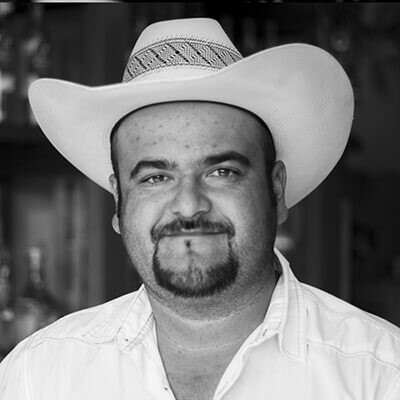
EMILIO VIEYRA
2021 NAPPC FARMER-RANCHER – MEXICO
Emilio Vieyra owns and operates Mezcal Don Mateo de la Sierra to produce one of the few environmentally friendly, sustainable mezcals. He ensures that the areas where they grow agaves remain forested and was one of the first to receive recognition of Bat Friendly© practices, keeping the recognition each year since 2016. In keeping with this recognition, Emilio allows at least 5% of his agaves to flower for bats and other pollinators. The majority of bats visiting their plants are the endangered Mexican long-nosed bat (Leptonycteris nivalis), showing the impact of their practices at the local level. Regionally, Emilio is educating his peers and extending his practices to other mezcal producers. He also hosts practical seminars covering all his production processes for bartenders and others during the flowering season, creating many other promoters of Bat Friendly© practices in the process.
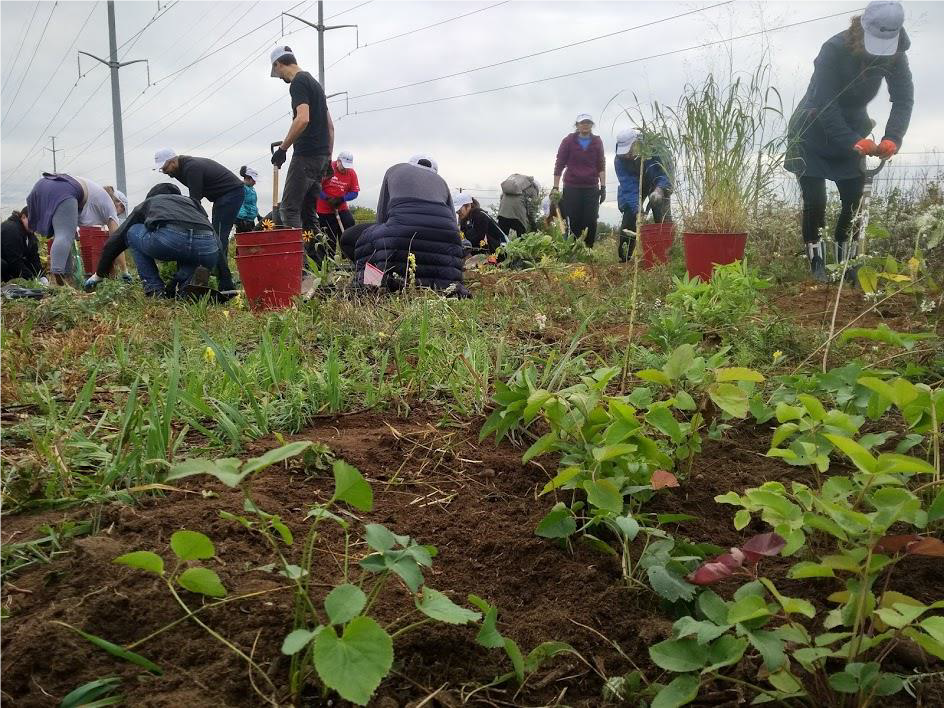
TORONTO AND REGION CONSERVATION AUTHORITY
2021 NAPPC ELECTRIC POWER
Toronto and Region Conservation Authority’s (TRCA) The Meadoway is an active urban restoration project in Toronto, ON that encompasses 200 hectares and 16 linear kilometers of the Gatineau Hydro Corridor between the Don River Ravine and the Rouge National Urban Park. The goals of the revitalization are to create and maintain a diverse, native meadow habitat for local wildlife and to create and active East-West link between Toronto and the Rouge National Urban Park. Full project completion is expected by the end of 2024, but by the end of 2021, 64 hectares will have been restored, completing 70% of the project. The Meadoway will connect seven rivers and ravine systems, 15 parks, 16 km of trail, 13 neighborhoods, over 200 hectares of greenspace, and more than 1,000 diverse species of flora and fauna. Corporate and community groups have also been engaged as participants in stewardship activities including the planting of native potted stock, garbage collection, invasive species removal, and interpretive walks.
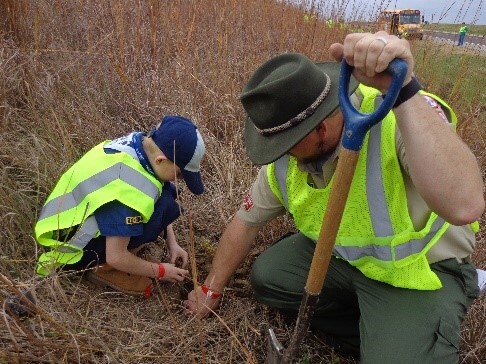
NEBRASKA DEPARTMENT OF TRANSPORTATION
2021 NAPPC ROADSIDE MANAGERS
The Nebraska Department of Transportation (NDOT) includes environmental stewardship as a goal within its mission statement and seeks to fulfill this commitment by establishing desirable vegetation, managing roadsides, and removing undesirable plants. A Roadside Development and Compliance Unit focuses on an ecoregional approach to these activities to ensure that the agency’s rights-of-way serve as pollinator habitat and are improved as appropriate. Seed mixtures planted off highway shoulders contain nearly 25% native wildflower seed, and NDOT has been working with Nebraska Game and Parks Commission to plant locally adapted high-diversity prairie seed along the 321 mile-long Nebraska Cowboy trail. NDOT has also taken great care to steward small white lady slipper orchid, a very rare orchid pollinated by halictine bees. In the Cowboy Trail project alone, 60 acres and more than 15,000 milkweeds were hand planted. NDOT has also funded University of Nebraska research investigating wildflower islands’ effects on pollinating species and pollinator use of roadside vegetation.

PETER KEVAN
2021 NAPPC LIFETIME ACHIEVEMENT
Peter Kevan is University Professor Emeritus for the School of Environmental Sciences at the University of Guelph. He was Scientific Director for the Canadian Pollination Initiative Strategic Network from 2009-2015 and has served on the executive Committee of the International Union for Biological Sciences since 2009. He also serves as President of the International Commission for Plant Pollinator Relations. Dr. Kevan received his B.Sc. from McGill University in 1965 and his Ph.D. from University of Alberta in 1970. He has had full-time appointments with the Canadian Wildlife Service, Agriculture Canada, Memorial University of Newfoundland, University of Colorado, and University of Guelph. Dr. Kevan developed and taught pollination biology courses for undergraduate and graduate students in Canada, USA, Mexico, Brazil, and Colombia and is the editor of several influential books including “Pollinating Bees: The Conversation Link Between Agriculture and Nature” and “Practical Pollination Biology”. He has authored over 250 scientific papers and book chapters and holds several patents. He is a pioneer in micrometeorology of plants and insects and was one of the first to ask questions about pollination conservation in the 1970s. He is a founder of NAPPC and has been instrumental in the many successes of this collaborative.

THE ALMOND BOARD OF CALIFORNIA
2021 NAPPC BUSINESS FOR BEES
The Almond Board of California (ABC) and the over 7000 growers it represents are true leaders in pollinator conservation. For many years, they have worked to improve habitat in and around orchards, supported important research, and helped growers get credit for the practices they already execute to improve bee health. In 2020, ABC launched its five-point Pollinator Protection Plan aimed at protecting bees during the almond bloom and beyond, reaffirming the industry’s long-standing commitment. This plan includes: 1. partnering with Pollinator Partnership’s Bee Friendly Farming program to integrate it with the California Almond Sustainability Program’s bee health module, 2. implementing a series of in-orchard workshops covering its previously developed Honey Bee BMPs, 3. improving communication between beekeepers and farmers by supporting the BeeWhere app, 4. increasing on-farm floral diversity by working with Project Apis m. and others, and 5. funding five new research studies into honey bee health.
2020 Pollinator Award Winners
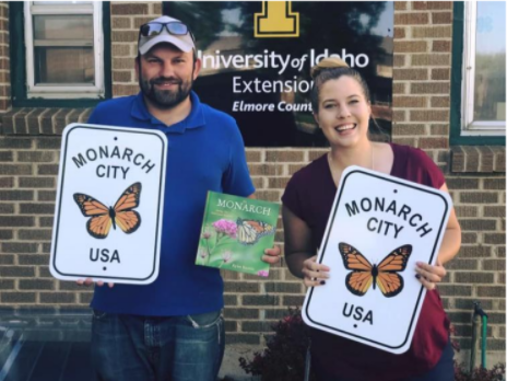
Brad Stokes, University of Idaho
2020 NAPPC POLLINATOR ADVOCATE USA
Brad Stokes of the University of Idaho is the Extension Education and County Chair for Elmore County. As a trained entomologist and environmentalist, Brad has advocated for pollinator protection through education in the areas of insect identification, habitat, reproductive processes, and nectar producing plant lists. Brad is a published author who often provides “Ask an Expert” answers on insect identification questions on the national extension platform. As an Idaho Master Gardener instructor, he certified 15 volunteers in 2019. He is also a key collaborator on the Just Bee-Cause project that provided plant lists and seeds, generating bee kits that are
disseminated throughout southern Idaho to homeowners, government agencies, and agricultural producers. In 2018, Brad developed the Elmore County Bee Survey Project, which has collected over 1,900 bee specimens and documented all Anthophila species in Elmore County. He has also declared Pollinator Awareness Day during National Pollinator Week and co-hosts Arbor Day events, where he and his staff promote pollinator protection, distribute wildflower seed, and participate in other educational activities. In 2020, Brad authored and Mayor Rich Sykes of Mountain Home, MT signed the City of Mountain Home Pollinator Appreciation Week Proclamation.
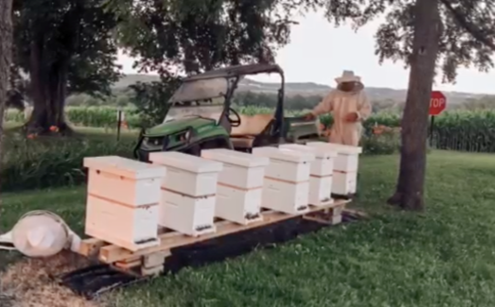
Jim Croskey and Family
2020 NAPPC-NACD FARMER-RANCHER USA
Jim Croskey and Family now have four generations living and working at Dalroy Farms, Inc. in Holmes County, Ohio. The Schlegel and Croskey families operate a 650-acre farm where they milk 180 head and grow hay and other crops. Jim makes most of the cropping decisions, allowing him to work his growing passion of beekeeping into the operation. They now manage over 20 hives, and Jim’s wife, Shirley, has become a spokesperson and advocate in their community for the health benefits of consuming local honey. The farm has been no-till for decades, and cover crops like clover are implemented as forage for the cows and to improve soil health via nitrogen fixation. After years of these practices, Jim has also been able to reduce his pesticide use and is careful to time his applications to minimize pollinator exposure. Jim uses his appreciation for native plants to guide his management of buffer zones and pollinator patches, and has even identified areas of poor crop production to be converted to bee forage areas. Jim has also developed unique local partnerships, acting as a bee rescuer for nearby sawmills and installing a pollinator habitat and a hive for the Killbuck Wildlife Area
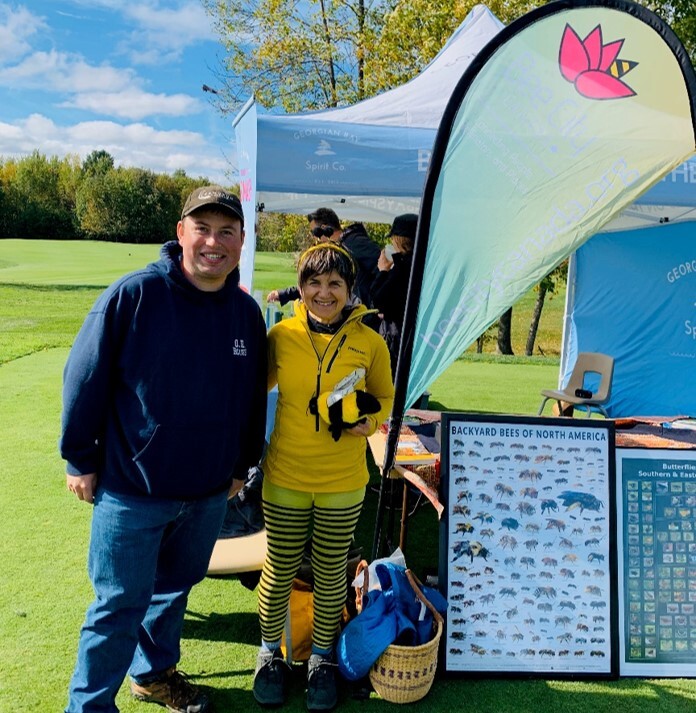
Shelly Candel, Bee City Canada
2020 NAPPC POLLINATOR ADVOCATE CANADA
Shelly Candel, inspired by Bee City (USA), started Bee City Canada in 2016. Under her leadership, the organization has grown extensively in 4 years, inspiring cities, First Nation communities, schools, college/university campuses, and businesses to take action to protect pollinators. Bee City Canada has 3 main programs that recognize communities and organizations that are taking steps or are committed to future initiatives to help pollinators: Bee Cities, Bee Campuses, and Bee Schools. In each program, applicants must commit to helping pollinators through habitat creation and restoration, pesticide reduction, and community outreach and education. At a local level, these communities are challenged to make change for pollinators and empowered with the knowledge they need, inspiring others across the nation to follow their lead. Under Candel’s leadership since 2016, there are now 42 Bee Cities, 12 Bee Campuses, 41 Bee Schools, and 18 Bee Business Partners.
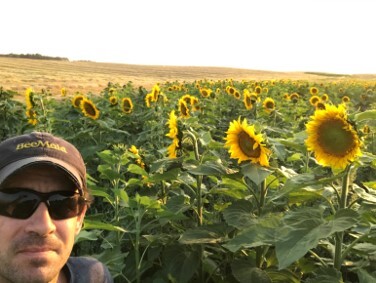
Ian Steppler, Steppler Farms Ltd
2020 NAPPC FARMER-RANCHER CANADA
Ian Steppler is the president of Steppler Farms Ltd, a farming enterprise that manages over 3,500 acres of arable land as well as a few thousand acres of pasture near Miami, Manitoba. Steppler Farms breeds and sells purebred Charolais cattle and operates a commercial honey bee operation of approximately 1,200-1,500 hives. Ian’s land management philosophy focuses on protecting flowering plants and grasses in order to provide year round nectar and pollen resources. Pastures are seeded with a grass seed and pollinator mix, including white and yellow sweet clover. Grazing rotations allow the flowering plants to bloom again, extending the overall flowering period. Ian always considers pollinators in his pest management decisions, and is passionate about not spraying ditches to the point that he works with his local municipality to mow 15 miles of ditches in his area. He is the vice-president of the Manitoba Beekeepers Association, a director of the Deerwood Watershed Authority, and leads the committee to establish the Knowledge and Research Transfer Program for the beekeeping industry in Manitoba. Ian also regularly shares his farming and beekeeping philosophy with others through his YouTube channel with 50,000 subscribers. In 2019, he spoke at 12 conferences outside the province and was the keynote speaker for the Manitoba Watershed Conservation Association’s annual conference.
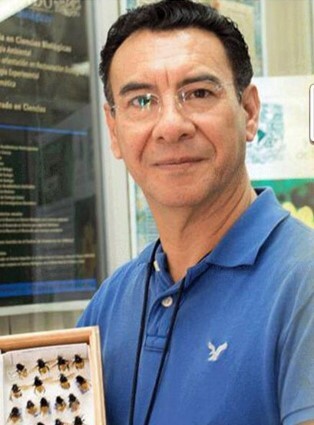
Dr. Ricardo Ayala Barajas, Instituto de Biología, Universidad Nacional Autónoma de Mexico
2020 NAPPC POLLINATOR ADVOCATE MEXICO
Dr. Ricardo Ayala Barajas is a researcher at the Instituto de Biología, Universidad Nacional Autónoma de Mexico at the Biology Station in Chamela. He is also Titular Researcher A of the National Research System Level 1. Dr. Ayala has dedicated more than 3 decades to research, teaching, and the dissemination of pollinator knowledge, specifically on the native bees of Mexico. He has more than 80 articles in indexed magazines, 6 books, and 26 book chapters about native bees and their importance. Significantly, Dr. Ayala has contributed to the knowledge of a large number of bee species and their importance, not only in Mexico, but in other countries as well.
2019 Pollinator Award Winners
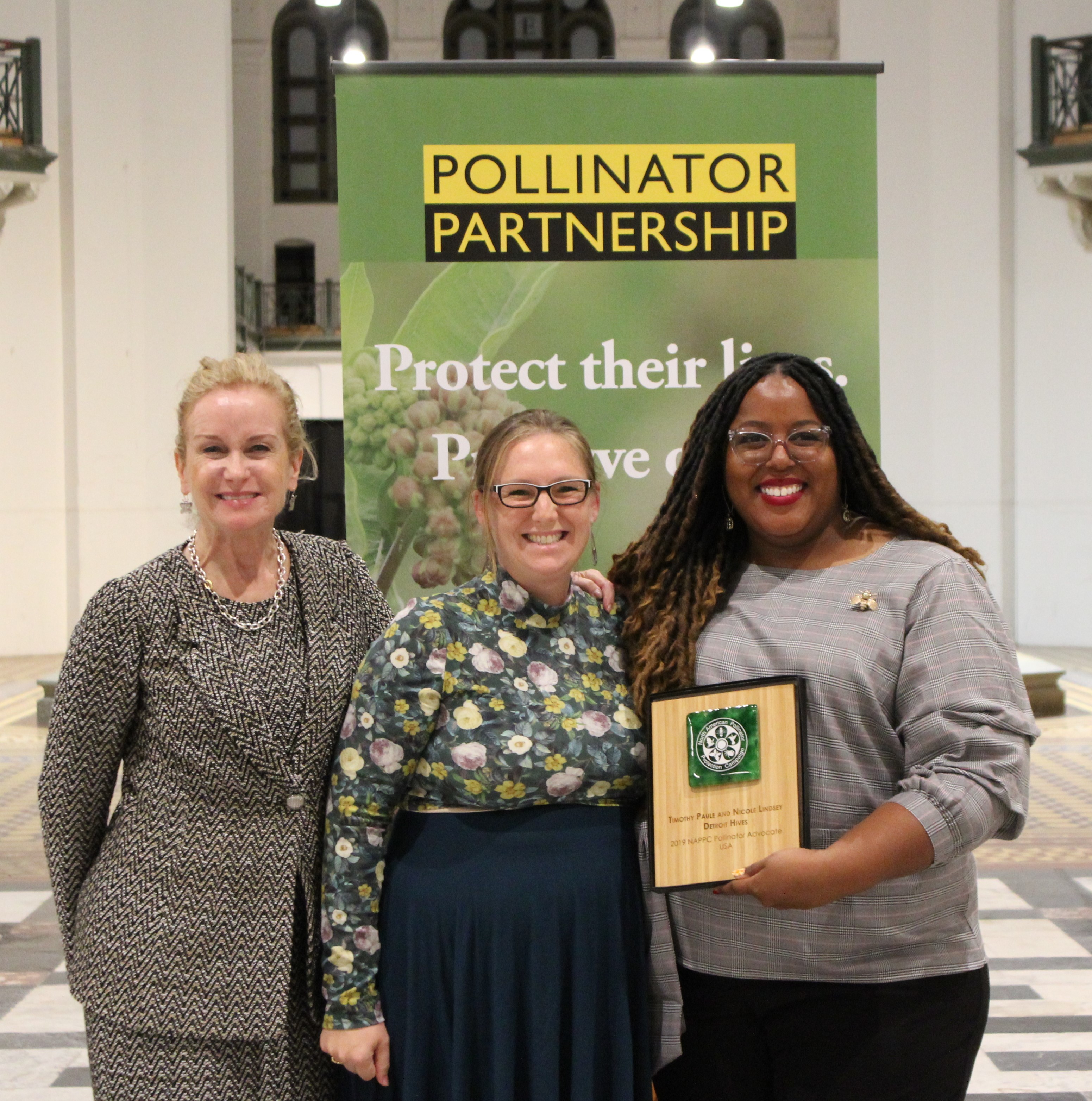
Timothy Paule and Nicole Lindsey - Detroit Hives
NAPPC POLLINATOR ADVOCATE USA 2019
Tim Paule and Nicole Lindsey became founders of Detroit Hives after Tim had suffered a cold and discovered the healing powers of honey. In their hometown of Detroit, they have been able to convert abandoned into functioning and healthy honey bee apiaries. They educate younger generations about the importance of the ecosystem through events where visitors can try on a beekeeping suit, sample honey, and learn about bees.
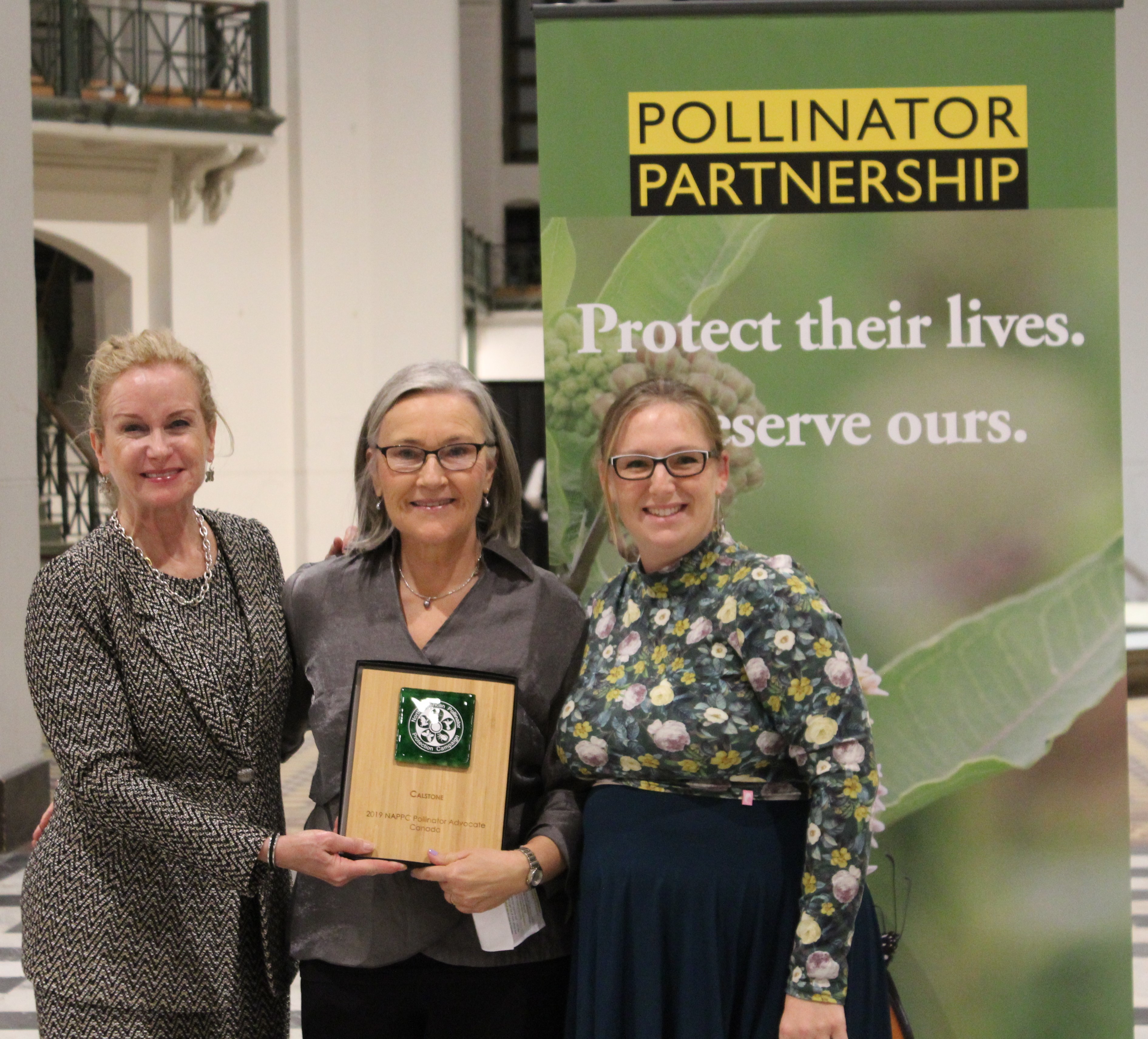
Cindy Cohanim - Calstone
NAPPC POLLINATOR ADVOCATE CANADA 2019
Established in 1985, Calstone is a family owned Canadian manufacturer of steel office furniture. Calstone is taking initiative to follow a “green” path towards combating global warming and climate change. In 2015, Calstone teamed up with the Toronto and Regional Conservation Authority and the Toronto District School Board to support Tom Longboat school with an outdoor raingarden project. The pollinator raingarden has inspired young children to appreciate nature and learn how to identify indigenous plants and which ones are beneficial to butterflies and bees.

Equipo Abejas
NAPPC POLLINATOR ADVOCATE MEXICO 2019
Equipo Abejas has been working since 1986 with students, technicians, project coordinators, and researchers in order to harmonize the relationship between society and nature. With a group of about 25, around half of the members dedicate their time to research while the other half of the members are educators. With a focus on honeybees and native bees, their mission is to deepen the publics’ knowledge on the practices and processes of honey production and healthy and environmentally friendly beekeeping strategies.
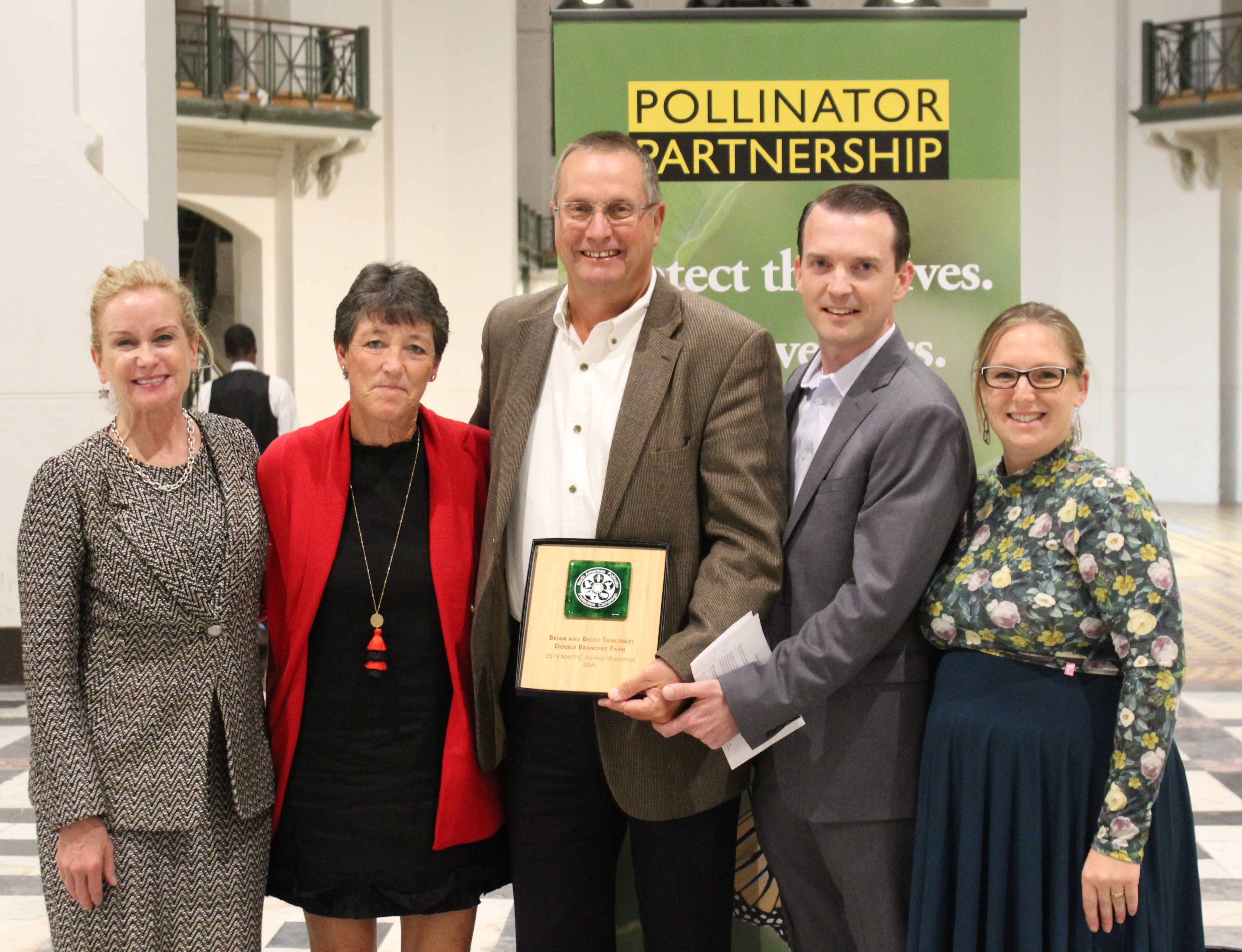
Brian and Becky Tankersley - Double Branches Farm
NAPPC-NACD FARMER-RANCHER USA 2019
Brian and Becky Tankersley are owners of the Double Branches Farm in Lincoln County, Georgia. This 97-acre farm features pick your own berries and in season vegetables. They have worked hard to provide positive habitats for pollinators, and in order to promote pollinator awareness and conservation, Brian has written news articles pertaining to pollinators. Doubles Branches Farm serves as an outdoor classroom to educate parents and their children on the importance of farm life and pollinator-friendly practices.
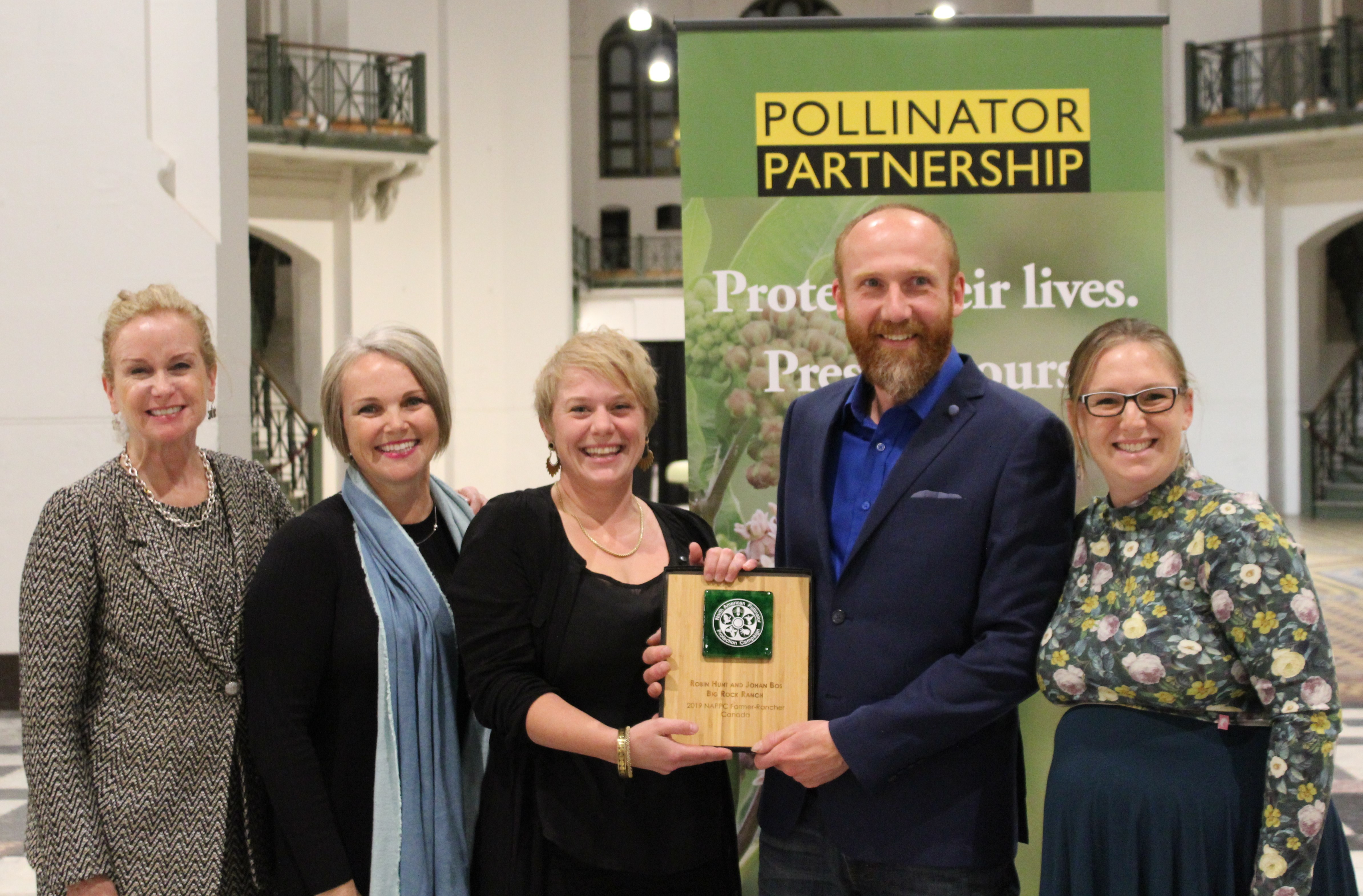
Robin Hunt and Johan Bos - Big Rock Ranch
NAPPC FARMER-RANCHER Canada 2019
Big Rock Ranch is a family-run, certified bee-friendly farm that raises free-range heritage chicken, runs a mixed fruit and vegetable garden market, and a small Bed and Breakfast. Robin Hunt and Johan Bos strongly believe in keeping its food as close to its source as nature intended. With a passion for sustainable farming and animal welfare, this young couple embarked on an adventure to providing the public with access to fresh, locally-grown produce.
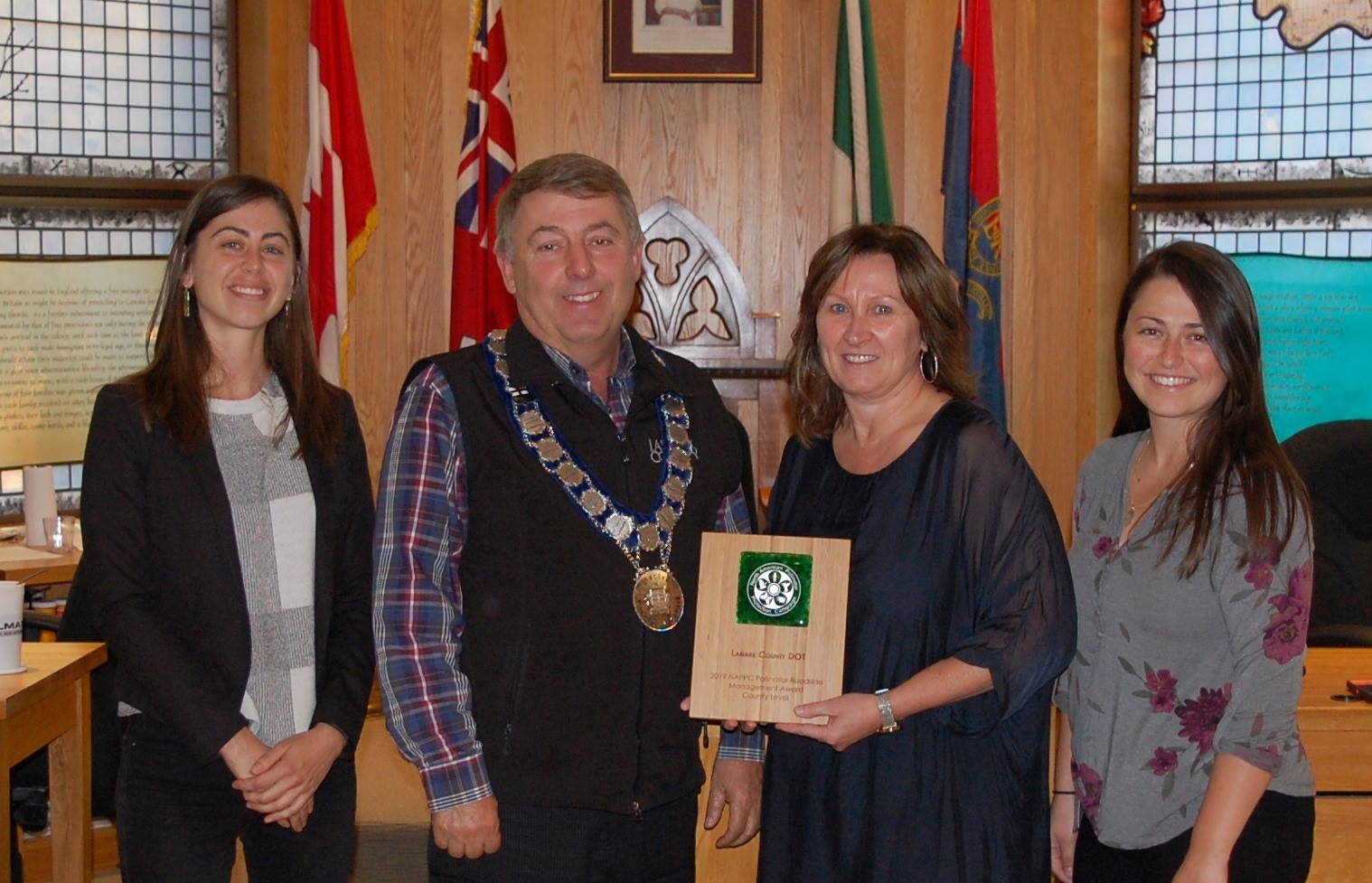
The Corporation of the County of Lanark
NAPPC ROADSIDE MANAGERS 2019
Lanark County has implemented roadside maintenance practices that optimize necessary roadside activities and maintain pollinator habitat. Their long-standing mowing schedule reduces mowing in June, July, and August when pollination activities are peaking. The goal of the County’s mowing practice is to reduce the area of the roadside that requires mowing, while still providing safety for road users, but also maintaining good pollinator habitat in the area beyond the mowed section. In addition, broad herbicide application, as a general vegetation control, has not been practiced in Lanark County in over 25 years. As a result, the road allowances in Lanark County grow abundant pollinator habitat naturally, which the County wants to promote everywhere. Lanark County has also provided habitat for pollinators by creating pollinator patches, where they planted over 1,000 pollinator-friendly plants between 2017 and 2018 that bloom throughout the growing season. Lanark County is also participating in the monarch restoration project with the Canadian Wildlife Federation, the goal of which is to produce a technical document to aid roadside managers on how to manage their corridors.
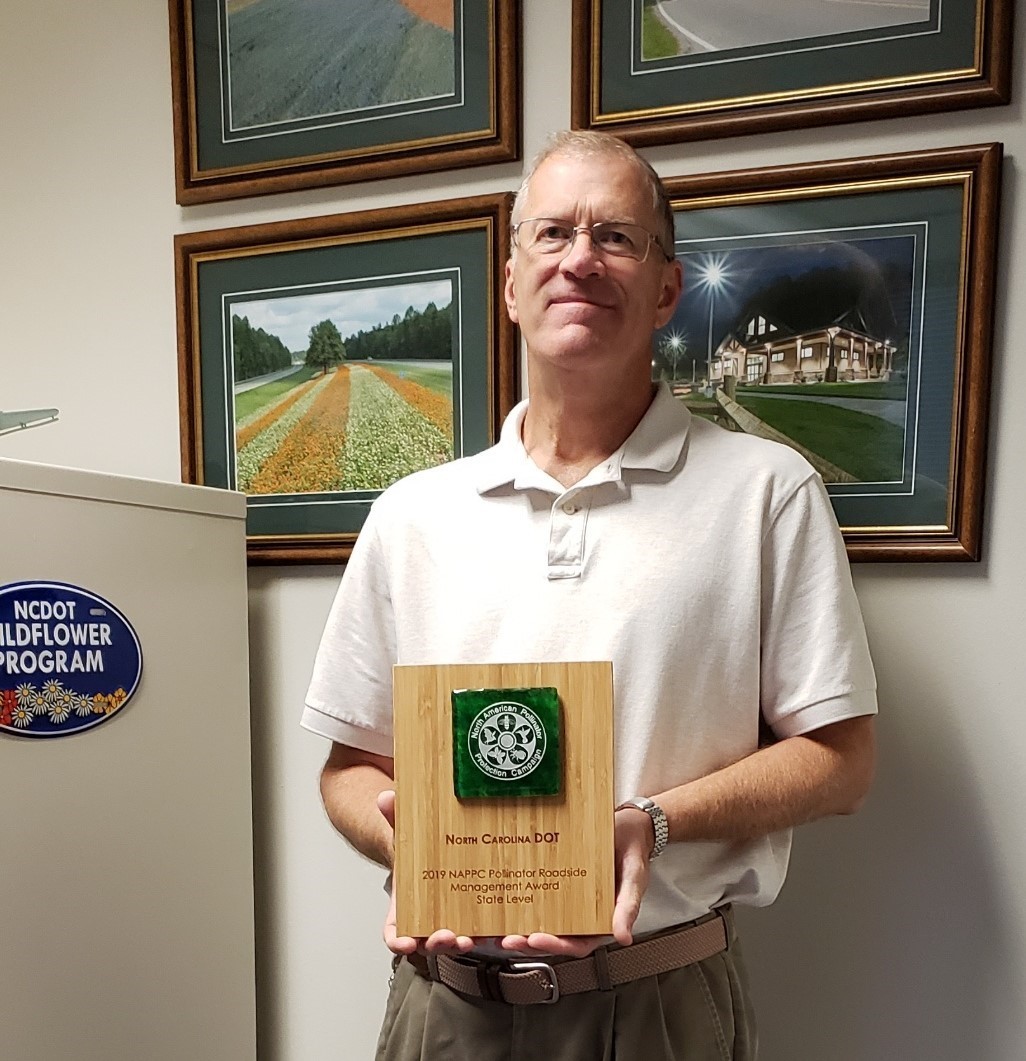
North Carolina Department of Transportation
NAPPC ROADSIDE MANAGERS 2019
NCDOT began its Roadside Environmental Unit Wildflower Program in 1985. The program is still prospering and has created beautiful wildflower beds throughout the entire state of North Carolina. NCDOT is also active at local bee club events and educates the public on pollinators at its annual state fair booth. The additions of horticulture plant bed programs and clear zone improvement programs have bolsters the agency’s efforts in recent years. Pollinator license plates purchased throughout the state help ensure consistent funding for the Roadside Environmental Unit into the future.
2018 Pollinator Award Winners
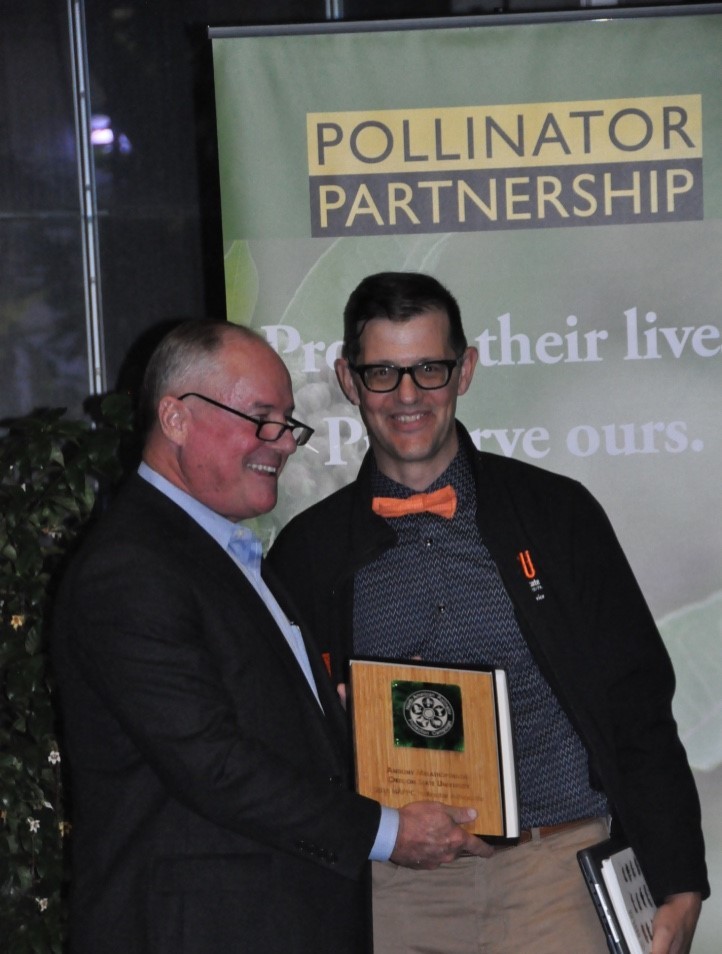
DR. ANDONY MELATHOPOULOS - OREGON STATE UNIVERSITY
NAPPC POLLINATOR ADVOCATE USA 2018
Dr. Andony Melathopoulos of Oregon State University is an entomologist with a passion for promoting bee health and educating growers, forest landowners, landscapers, the general public, and pesticide users. He has worked with various stakeholders to make tremendous strides in helping develop a strategic plan to promote the health of both wild and managed bees in the State of Oregon. In early 2017, he was instrumental in the creation of the Oregon Bee Project, a multi-agency initiative aimed at protecting bees from pesticide exposure, increasing habitat, reducing impacts of diseases and pests on bees, and expanding understanding of the bees of Oregon. As part of this initiative, Dr. Melathopoulos has trained 163 individuals and formed 10 regional volunteer groups to collect and pin bees for the Oregon Bee Atlas. For Pollinator Week 2018, he coordinated 20 events across the state. He has also produced 50 episodes of PolliNation Podcast, which feature special guests and highlight issues bees face. Since September 2016, Dr. Melathopoulos has personally presented to more than 2,500 pesticide applicators on practices to minimize pesticide exposure risk to bees.
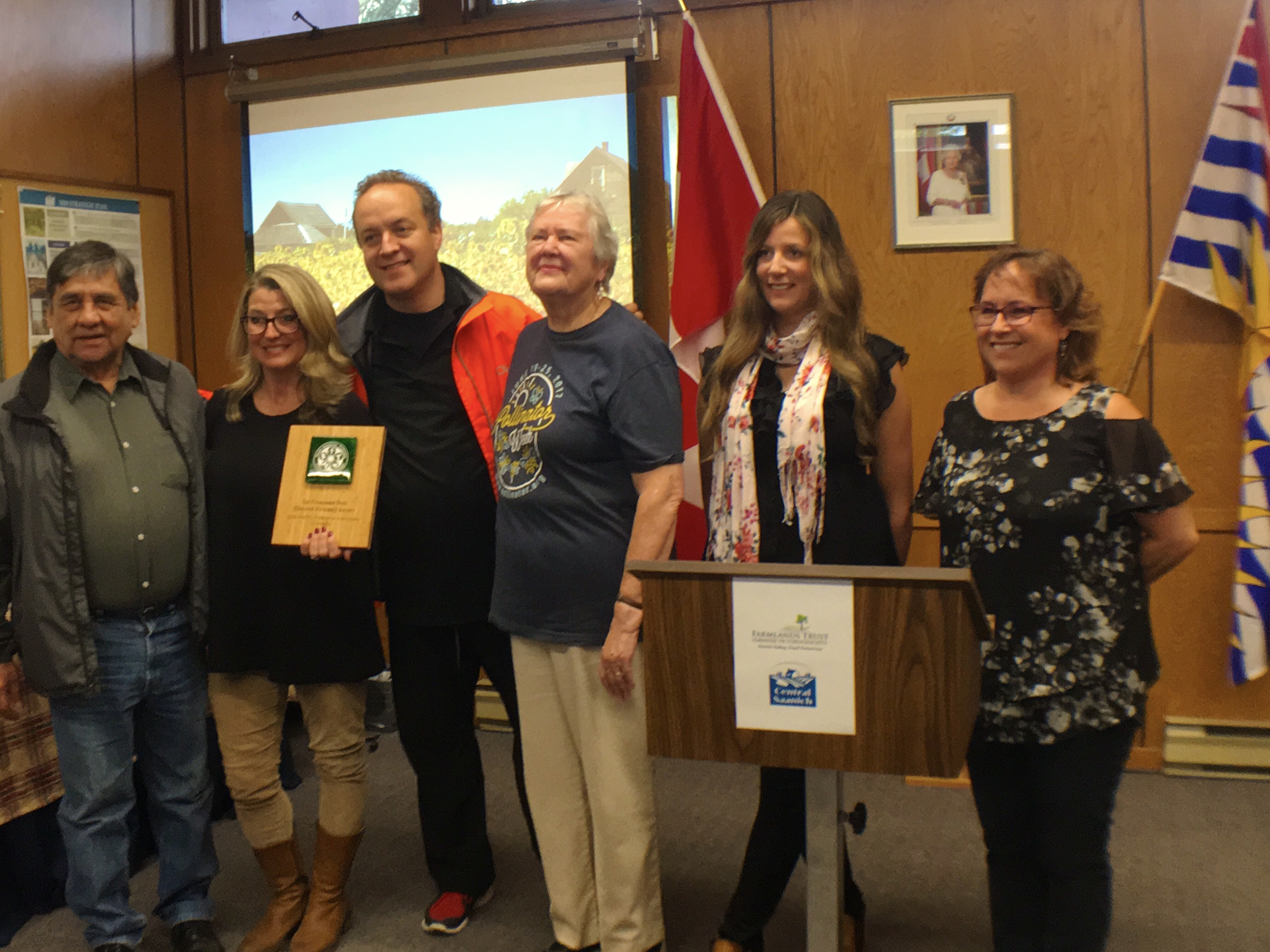
THE FARMLANDS TRUST SOCIETY
NAPPC POLLINATOR ADVOCATE CANADA 2018
The Farmlands Trust Society (FLT) is a charitable not-for-profit organization located in Saanichton, British Columbia. The FLT works to enhance farming capacity in the Greater Victoria area by protecting local farmland, protecting eco-sensitive and culturally special areas, producing food for those in need, providing relevant educational opportunities, promoting the economic viability of farmland, and providing community access and public awareness programs. Since 2012, the society has been gradually returning the 100-year-old historic Newman Farm in Saanichton to active agricultural uses. FLT leads the “field to plate” initiative at Newman Farm where FLT volunteers grow, harvest, and donate local fruits and vegetables to those in need at Our Place Society in Victoria to aid in relieving poverty and mitigating food insecurity for marginalized populations in society. They are also important, active members of the Island Pollinator Initiative.
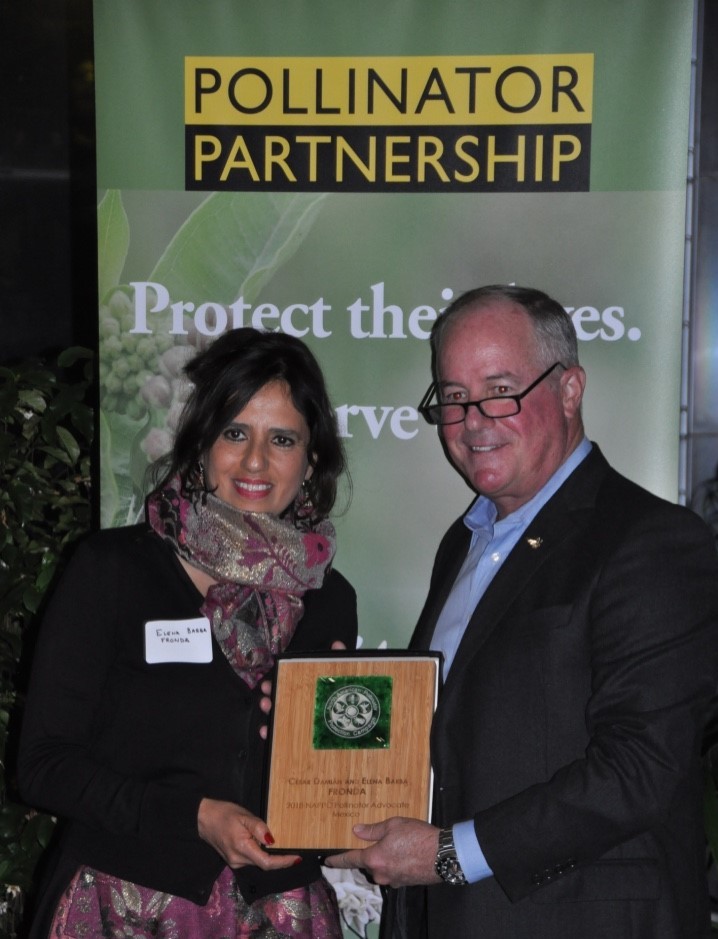
CÉSAR DAMIAN AND ELENA BARBA - FRONDA
NAPPC POLLINATOR ADVOCATE MEXICO 2018
César Damian and Elena Barba are co-founders and directors of FRONDA, a non-profit organization whose objective is to promote artistic disciplines in rural and urban spaces outside of Mexico City, through the creation of projects aimed at the creation, exploration, training, exchange and dissemination of interdisciplinary and intercultural art. In February, FRONDA developed the culture event “Symbiosis, Encounters between Bees, Artists and Scientists” in Mexico. FRONDA is adapting Border Free Bees’ methods of community-based art practice and collaborations to the Mexican context where students are often afraid to speak out about environmental issues. FRONDA intends to weave ties between artists, educators, scientists, physical places, and memory, through activities of interaction with the community, giving pollinator projects an emphasis that favors the Mexican identity and local values.
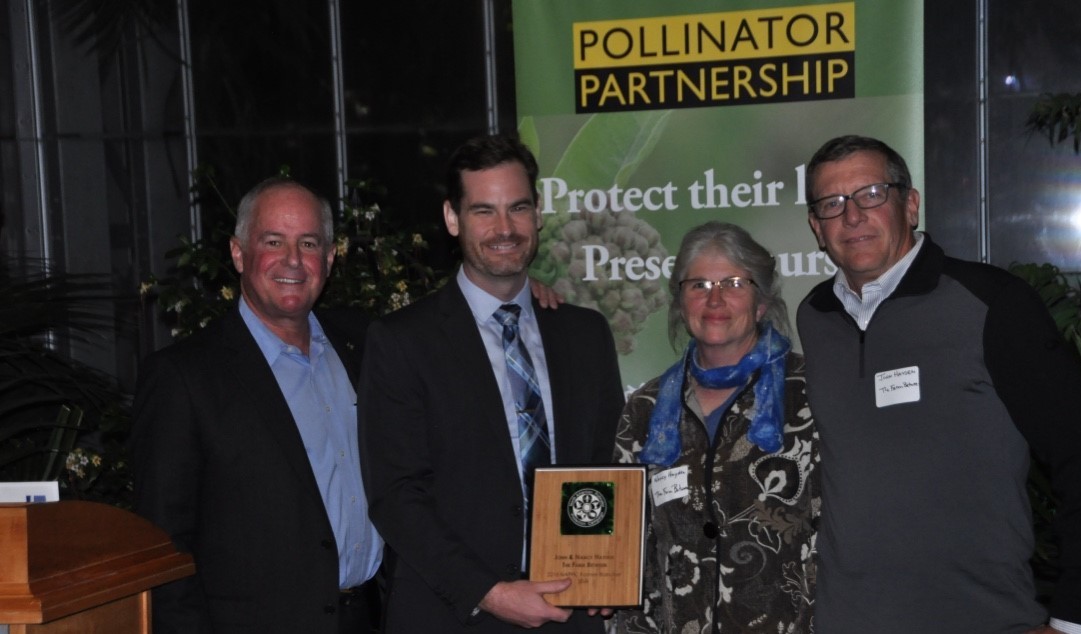
JOHN AND NANCY HAYDEN - THE FARM BETWEEN
NAPPC-NACD FARMER-RANCHER USA 2018
John and Nancy Hayden have been proprietors of The Farm Between in Jeffersonville, Vermont for 26 years. The Farm Between is a 20-acre certified organic nursery and fruit farm specializing in production and sale of pollinator-dependent fruit and berry crops, shrubs, and trees, and more than half of the farm’s area is devoted to pollinator habitat enhancement. John, a trained entomologist, has made a number of significant contributions in the area of pollinator conservation and management, including the establishment of a 14-acre pollinator sanctuary at a former dairy farm, where he conducts long-term bee species diversity monitoring and demonstrates effective pollinator land management practices. In 2007, John and Nancy founded Seeds of Self-Reliance, a nonprofit organization with international scope working to promote biological diversity of pollinators and other organisms in the context of sustainable agriculture. A related program, Pollinator Pathways, provides outreach and education in Vermont on the importance of pollinators to our food systems. In 2016, John was appointed by Vermont’s governor to serve on the state’s Pollinator Protection Committee, and he is frequently asked to testify before legislative committees on pending legislation related to pesticide use, pollinator conservation, and sustainable agriculture.
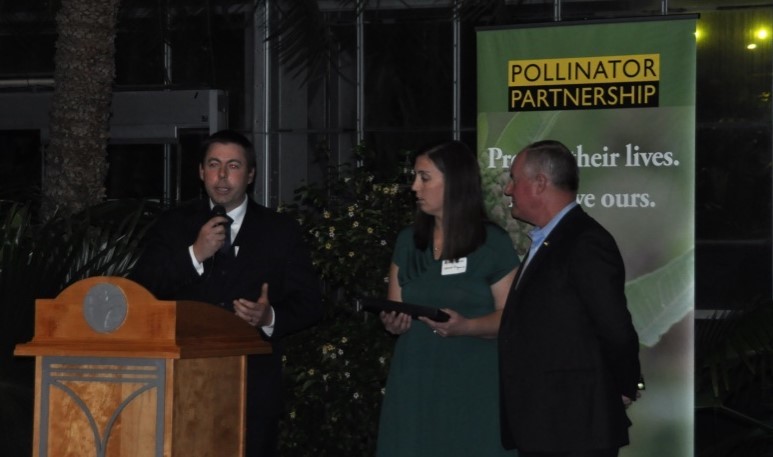
CODY STRAZA AND ALLISON SQUIRES - UPLAND ORGANICS
NAPPC FARMER-RANCHER CANADA 2018
Cody Straza and Allison Squires are co-owners and operators of Upland Organics, a 2000 acre certified organic grain farm near Wood Mountain, Saskatchewan. Their vision is to create a family orientated, environmentally and economically sustainable organic farming operation, which contributes in a positive and significant way to both the local community and the greater organic agricultural community. To this end, they are working towards converting their entire farm to no-till. Cody serves as the Vice President of SaskOrganics, allowing him to promote the organic industry across the prairie provinces. He also joined the Organic Value Chain Round Table, bringing the prairie farmer’s perspective and input to national level discussions. Allison promotes involving organic producers at the individual farm level and believes that it will contribute to the overall applicability of research in this sector. She has helped implement several onfarm research projects at Upland Organics, and serves as director on the Canadian Organic Growers board. Upland Organics is a certified Bee Friendly Farm through Pollinator Partnership. They are one of the few large-acre farms in Canada to hold this certification.
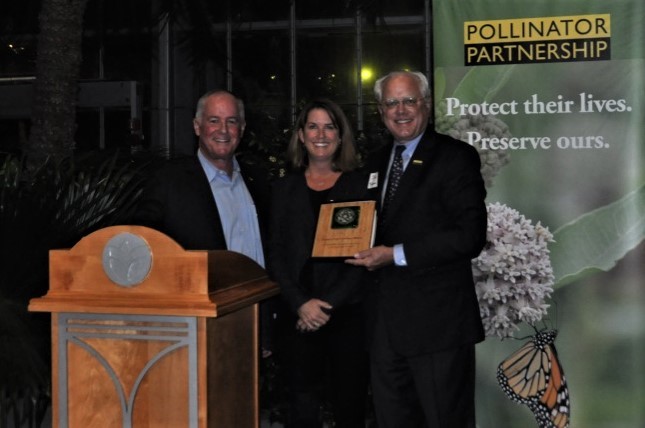
FRANCIS FORD COPPOLA WINERY
NAPPC BUSINESS FOR BEES 2018
Francis Ford Coppola Winery (FFCW) farms 75 acres of Bee Friendly Certified vineyards at its Geyserville, California winery. FFCW and the surrounding estate are also certified by the California Sustainable Winegrowers Alliance, a program that provides third-party verification of a winery’s commitment to sustainability and covers all aspects of operations including vineyards, wine production, worker safety, environmental impacts and continuous improvement. In addition to the vineyards, FFCW has extensive gardens that provide 6,000 lbs. of produce annually for the restaurants and flowers for decoration. Through the integrated pest management program, they promote the biodiversity of the vineyard with beneficial insects, soil fauna, bluebird boxes, and owls that combat pests of grapevines. Soil erosion is prevented using three-season cover crops that also replenish essential nutrients back into the soil. As a wider initiative, FFCW is part of Sonoma County Winegrower’s three-phase commitment to become the nation’s first 100% sustainable wine region by 2019.
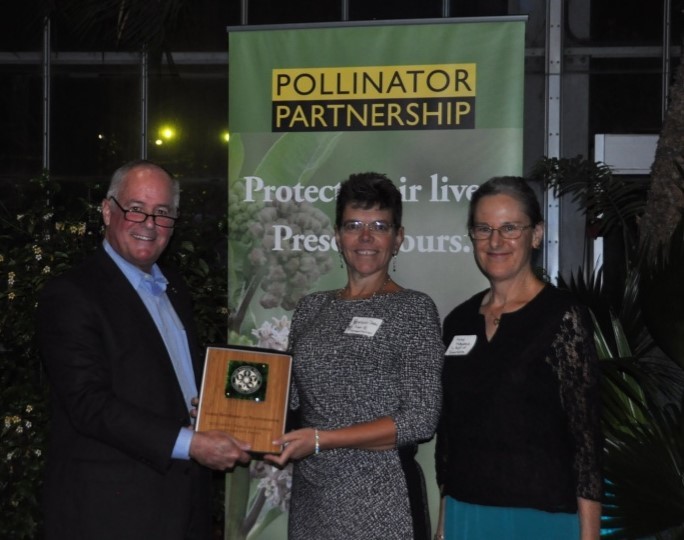
ILLINOIS DEPARTMENT OF TRANSPORTATION
NAPPC ROADSIDE MANAGERS 2018
The Illinois Department of Transportation (IDOT) has demonstrated their long-term commitment to pollinator habitat in multiple ways, including new mowing policies that will create an estimated 100,000 additional acres of pollinator habitat and the dedication of $500,000 of their annual budget for new pollinator habitat and restoration projects. They have also updated the statewide seeding specifications and standards to include monarch butterfly and pollinator friendly seed mixes, with multiple species of milkweed. Additionally, they place a large emphasis on pollinator friendly rights-of-way (ROW) management, partnering with companies to provide habitat along ROWs, engaging in multiple ROW working groups, serving on the ROW Sector Technical Team in 2017 and 2018, and drafting the Transportation ROW strategies for the sector. IDOT regularly engages the public with by staffing fair booths, registering existing habitat, and distributing over 7,000 seed packets. They are working towards restoring 200 acres of pollinator habitat since August 2016.
2017 Pollinator Award Winners
NIKOLAS LIEPINS - BEE KIND MN
NAPPC POLLINATOR ADVOCATE USA 2017
Nikolas Liepins, founder and COO of Bee Kind MN, gives age focused presentations to youth in local schools and scouts groups. After starting out as a project for his FIRST®Lego® League Team at Saint Paul Academy and Summit School, where his bee houses were a component for the competition solution, Nikolas took it upon himself to establish the 501c3, Bee Kind MN. He makes several resources available to the general public on his website including plant lists and bee house building instructions. He has also presented and held activities at Aldo Leopold Weekend at the Minnesota Valley National Wildlife Refuge, Landscape revival EXPO, and Pollinator Party in the twin cities area. In addition to education, Nikolas has partnered with 3M and Target Center to promote biodiversity by placing native bee houses across their campuses. On his website, 140 bee houses are registered from the United States, Canada, and France, and he provides free seeds for pollinator plants to all who register their bee houses in Minnesota. More at https://www.beekindmn.org/.
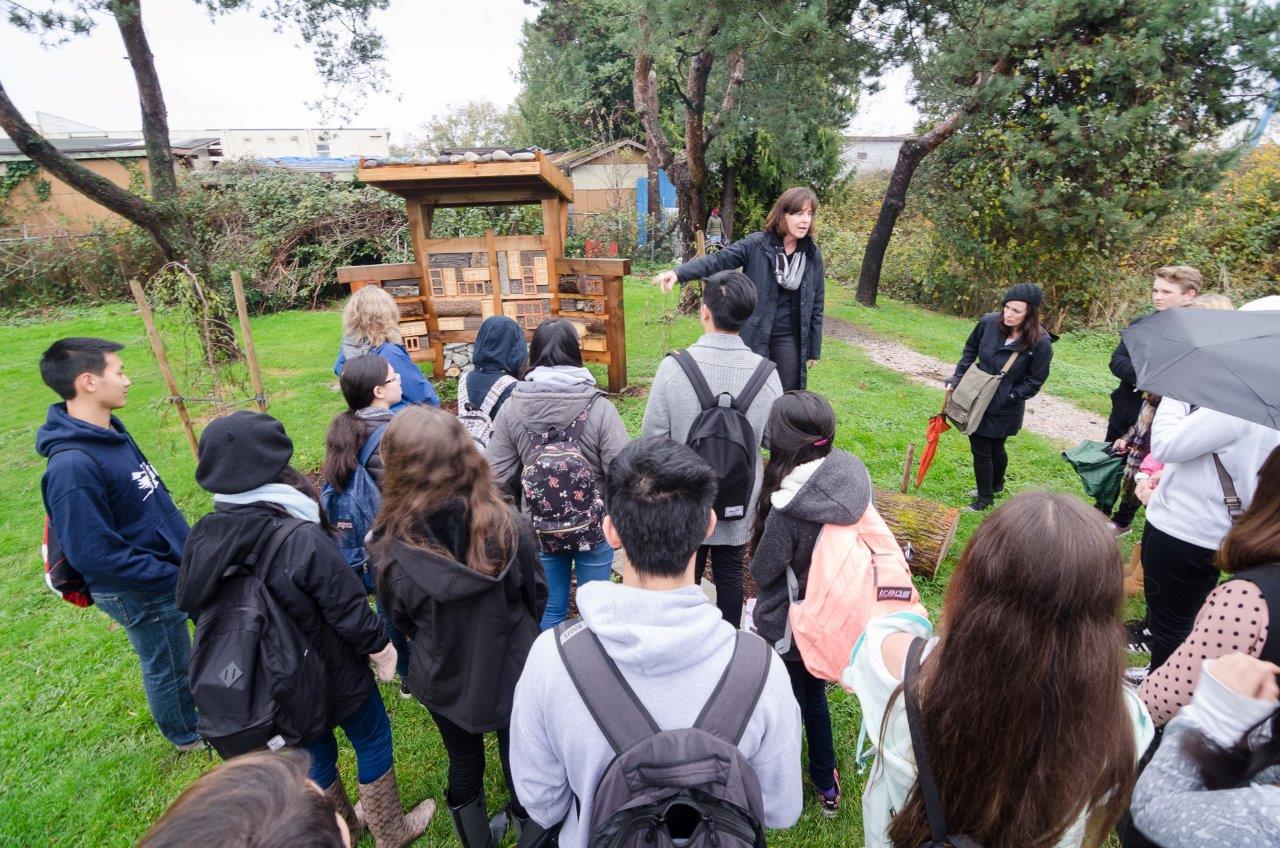
DR. CAMERON CARTIERE AND NANCY HOLMES - BORDER FREE BEES
NAPPC POLLINATOR ADVOCATE CANADA 2017
Dr. Cameron Cartiere and Nancy Holmes of at Border Free Bees provide a model for how communities can come together to create and preserve pollinator habitat and understand the scope of pollination systems. For the last three years, this project has been influential in biodiversity conservation in the province of British Columbia, particularly in the municipalities of Richmond in the Vancouver area and Kelowna in the agricultural valley of the Okanagan. It has created over 40 projects, events, and educational experiences in these communities, ranging from major plantings and significant art exhibitions to smaller community gatherings and projects. Although Border Free Bees is in its last year, the projects will continue into 2018 including projects that are being developed in Idaho and Mexico. More at http://borderfreebees.com/.
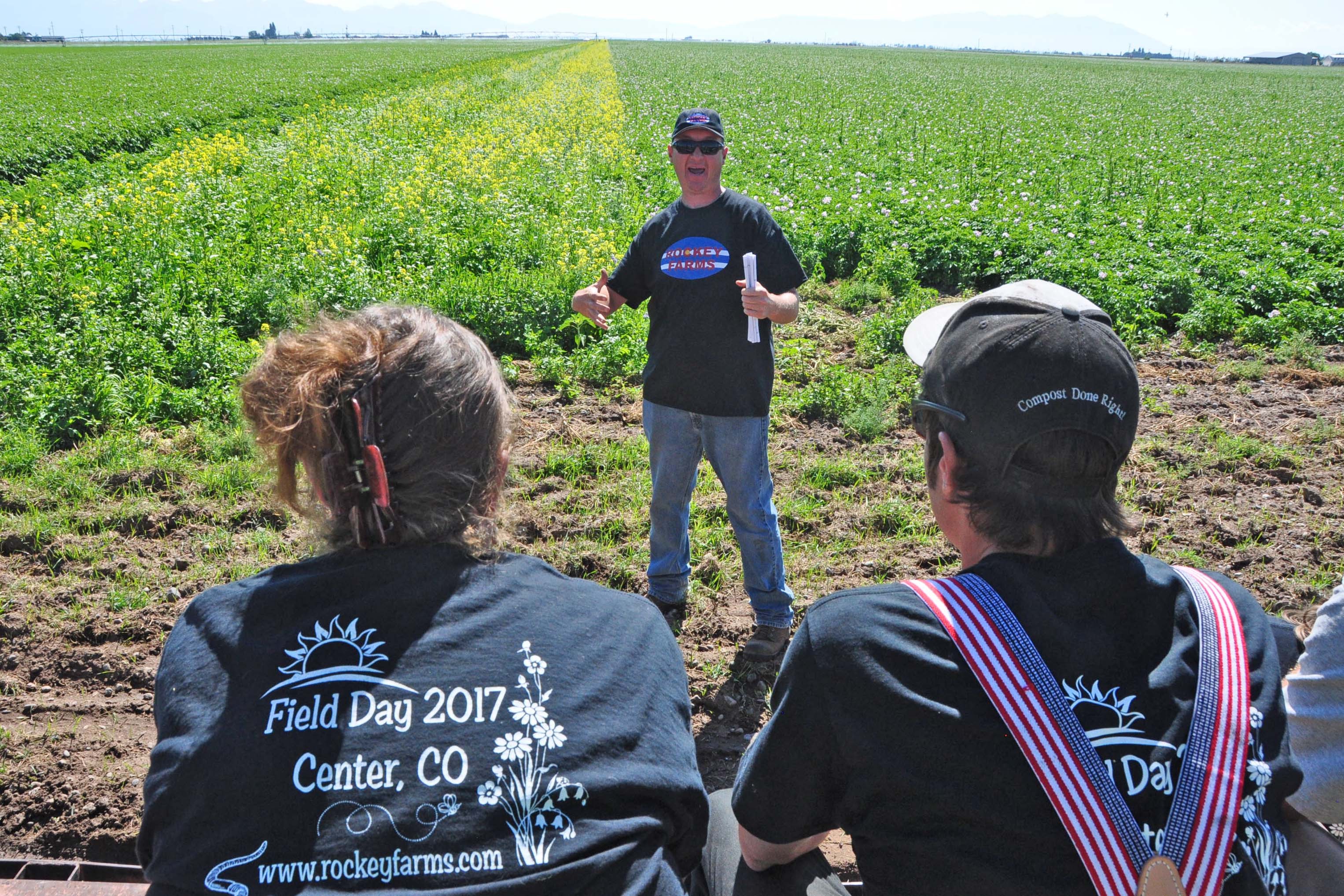
BRENDON ROCKEY - ROCKEY FARMS
NAPPC FARMER-RANCHER USA 2017
Brendon Rockey of Rockey Farms is known for growing its specialty potatoes and quinoa. Under Brendon’s direction, Rockey Farms has become a leader in using a biotic approach to farming. Brendon uses biological inputs like companion crops, livestock, green manure fields, and flowering strips instead of synthetic fertilizers, herbicides, and pesticides. These inputs are all part of a system that supports soil health and attracts pollinators as well as other beneficial insects that act as a defense against aphids and thrips. Four-row flowering strips in his fields serve as nectar hubs, and helped give his 90 seed potato lots a perfect inspection score under biotic Integrated Pest Management last year. Brendon also uses nectar plants in his potato greenhouse to create pollinator habitat and eliminate the need for insecticide. He has begun incorporating a legume heavy mix of companion crops that fixes nitrogen, mobilizes phosphorus, and creates more pollinator habitat. During the winter months, Brendon travels North America to share his success, and in 2017 went as far as France and Belgium. More at http://www.rockeyfarms.com/.
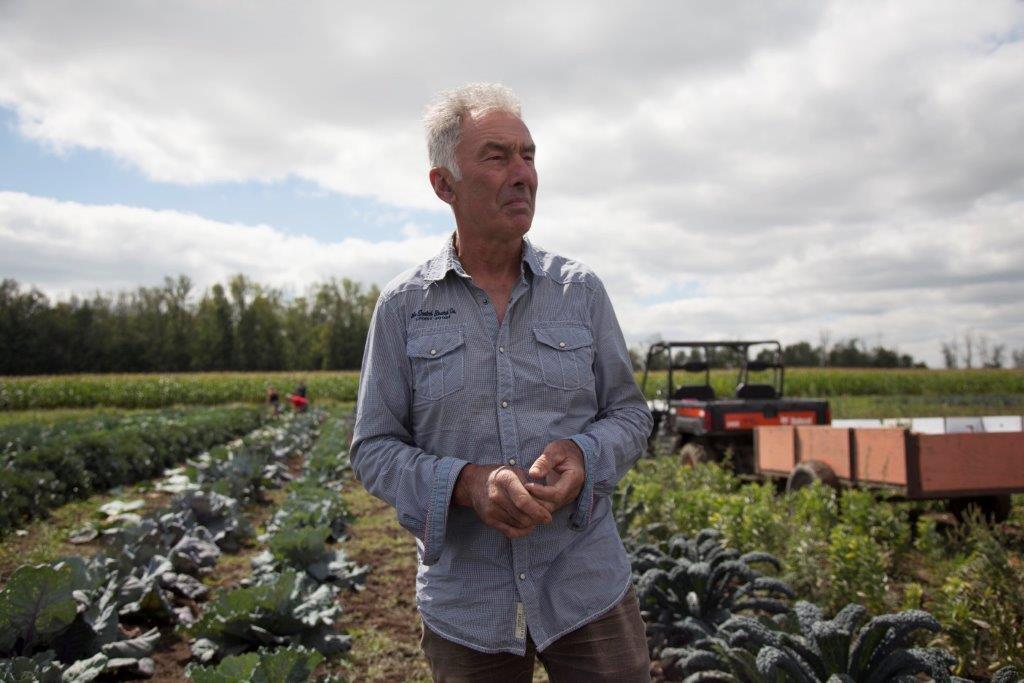
ANTONY JOHN - SOILED REPUTATION
NAPPC FARMER-RANCHER CANADA 2017
Antony John of Soiled Reputation has been supplying south-western Ontario for over 20 years with over 50 varieties of gourmet organic vegetables. It was also the host farm for former Foodtv show “The Manic Organic”, demonstrating the principles of organic gardening and associated benefits. Antony was trained as a wildlife biologist, and his farm is run as an ecosystem where maximizing biodiversity is the paramount objective. In addition to being certified organic, the farm is certified bee-friendly. A 2-acre meadow is home to 24 bee hives, and is used as a breeding station to produce more queens for other bee yards. Flowering plants can be found in the huge native garden, interspersed through crops, and in buffer strips that flower throughout the growing season, providing a consistent food source for pollinators. Legumes are also interseeded with crops and planted in buffer strips for nitrogen fixation and pollination. Grass strips and 20 acres of legumes in rotation provide further cover and food. More at http://soiledreputation.com/.
EDUARDO RENDON SALINAS - WWF
NAPPC POLLINATOR ADVOCATE MEXICO 2017
Eduardo Rendon Salinas began his work with monarchs in 1993 as part of a research team that systematically monitored monarch overwintering forests in Mexico. Since then, he has continued to monitor the monarch population, first as Assistant Director of the Monarch Butterfly Biosphere Reserve (MBBR) and, since 2004, as Director of the Monarch Butterfly Program for WWF. With MBBR, his research led to the increase of protected area from 16,110 to 56,259 hectares. He also established the baseline of forest cover in core habitat areas. In 2009, he was instrumental in working with the indigenous community to develop a community surveillance strategy that resulted in the eradication of clandestine logging in the MBBR core area. In 2013, Eduardo organized the First International Symposium on Research and Conservation of the Monarch Butterfly, and he has been instrumental in coordinating three more symposia. To date, he has coordinated the reforestation of 11,637 hectares of forests in the Monarch Region with 13 million native trees, 12 million of which have been produced in a network of 13 community nurseries established by WWF and its national and international partners. More at http://www.wwf.org.mx/.
2016 POLLINATOR AWARD WINNERS
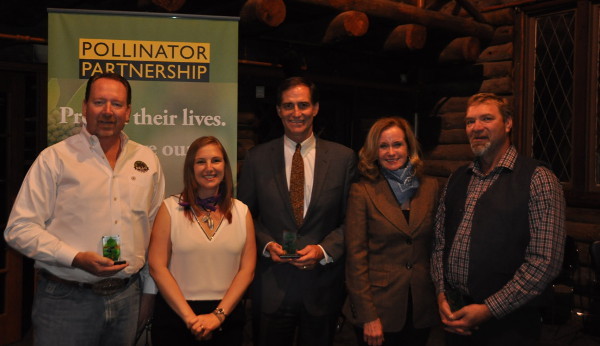
Dan Ashe - US Fish and Wildlife Service
NAPPC POLLINATOR ADVOCATE USA 2016
The winner of this year's U.S. Pollinator Advocate Award is Dan Ashe. Dan is the 16th Director of the U.S. Fish and Wildlife Service. He has been instrumental in the Save the Monarchs campaign, and has supported partnership-driven, landscape-scale m onarch conservation projects. Thanks to Dan's leadership, the US Fish and Wildlife Service will double the acres of restored or enhanced habitat for monarchs and other pollinators by September 30, 2017.
Bob McLean - Canadian Wildlife Services
NAPPC POLLINATOR ADVOCATE CANADA 2016
The winner of this year's Canadian Pollinator Advocate Award is Robert McLean, Executive Director of the Canadian Wildlife Service. For the last 35 years, Bob has been a leader in biodiversity conservation in North America – from the establishment of new National Wildlife Areas, to development of legislation to prevent international trafficking in endangered species, to the creation of the Habitat Stewardship Program and the Ecological Gifts program.
Alejandro del Mazo Maza - CONANP
NAPPC POLLINATOR ADVOCATE MEXICO 2016
The winner of this year's Mexican Pollinator Advocate Award is Alejandro Del Mazo Maza, the National Commissioner for Natural Protected Areas at the National Commission of Protected Natural Areas (Comisión Nacional de Áreas Naturales Protegidas, or CONANP). CONANP recognizes the foundational role pollinators play in both the natural and developed world. Under Alejandro's confident direction, CONANP has made significant steps in pollinator protection and set the pace for the whole country to follow.
Lakhy Sran - Sran Family Orchard
NAPPC FARMER-RANCHER USA 2016
The winner of this year's U.S. Farmer-Rancher Award is Lakhy Sran. Lakhy is a partner and second-generation grower at Sran Family Orchards. Located in Kerman, California, Sran Family Orchards is the largest grower of organic almonds. Under Lakhy's direction, Sran Family Orchards has been a leader in sustainability and bee friendly farming practices. Here to accept the award on Lakhy's behalf is Jason Hickman, Grower Relations at Sran Family Orchards.
Marc and Chantal Bercier - Ferme Agriber Inc.
NAPPC FARMER-RANCHER CANADA 2016
The winners of this year's Canadian Farmer-Rancher Award are Marc and Chantal Bercier. Along with their son Guillaume, Marc and Chantal operate a respected seed cleaning company and farm. They work to pioneer sustainable farming practices and show other farmers how restoring natural buffer zones can benefit both wildlife and the land.
2015 POLLINATOR AWARD WINNERS
Jode Roberts - Homegrown National Park Project, David Suzuki Foundation
NAPPC POLLINATOR ADVOCATE CANADA 2015
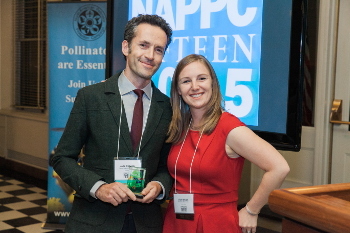
The NAPPC-NACD Farmer-Rancher Pollinator Award recognizes individuals who have contributed significantly to pollinator protection, conservation, and issue outreach resulting in increased awareness of the importance of pollinators and pollination within the agricultural community. This special award sheds light on the contributions of American farmers to natural and cultural resource preservation.
Phyllis Stiles - Bee City USA
NAPPC POLLINATOR ADVOCATE USA 2015
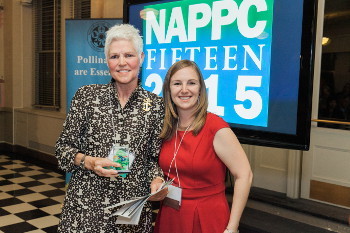
In 2012 Phyllis Stiles recognized that urban and suburban communities had the potential to provide vital habitat for imperiled pollinators. With the help of other volunteers, she launched the Bee City USA program to galvanize communities to sustain pollinators by providing them with healthy habitat, rich in a variety of native plants and free to nearly free of pesticides. Bee City USA affiliates submit an application and adopt a resolution, listing their pollinator conservation commitments. Cities, towns and communities across America are invited to become certified as Bee City USA affiliates. Phyllis, the bees thank you!
Emma Gomez-Ruiz - Texas A&M University
NAPPC POLLINATOR ADVOCATE MEXICO 2015
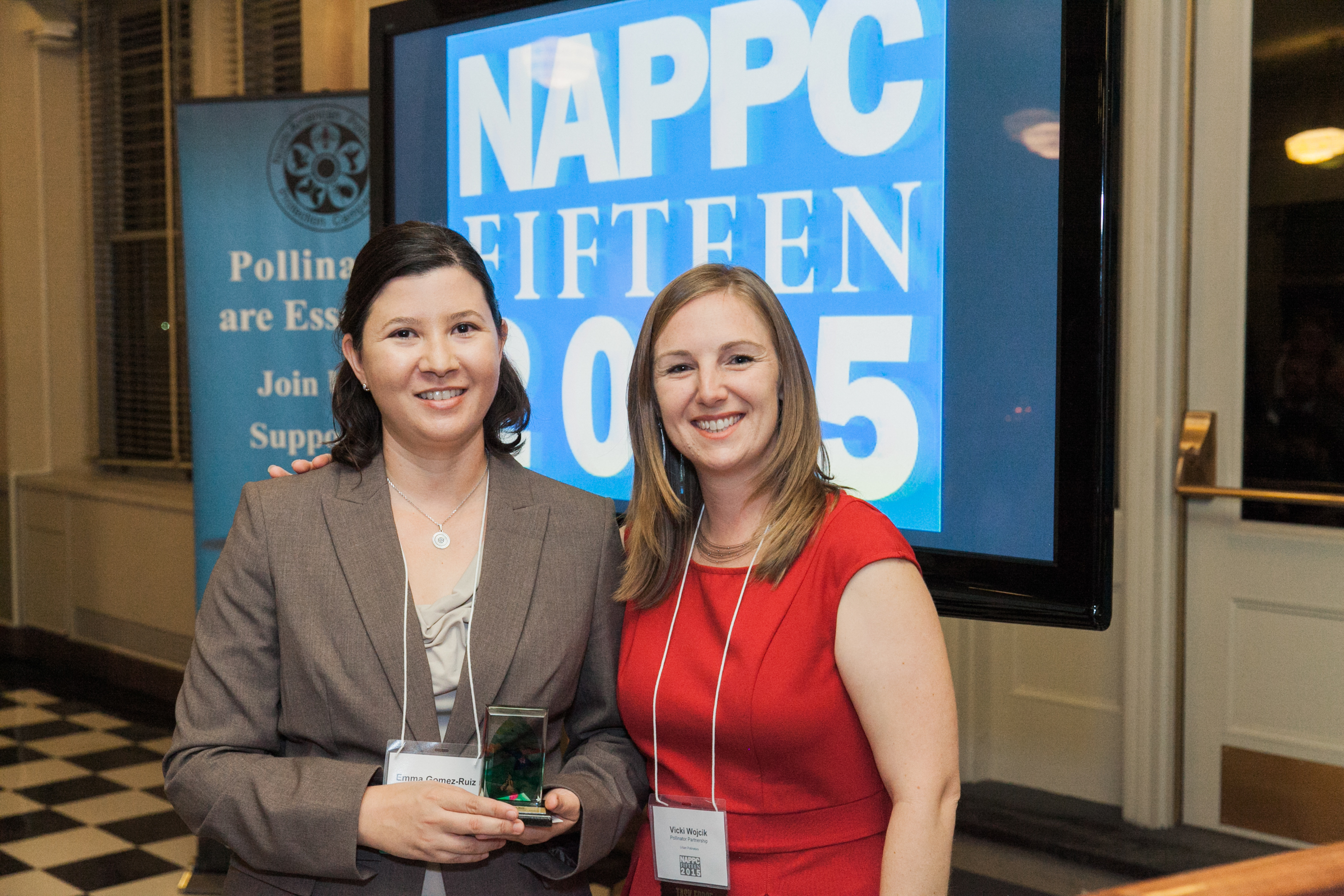
Implementing on-the-ground conservation in the real world where people, policy, economics, and environments interact requires a deeper understanding of the human component that can make or break a program. Emma Gomez-Ruiz struck the right balance with her work on the Mexican long-nose bat. Not only is her work reaching across political and regulatory boundaries as she uncovers the keys to conserving nesting habitats for pollinating bats – she’s also been able to get the attention of party goers and happy hour aficionados because without bats there won’t be any tequila. Salud Emma!
biodiversity.tamu.edu/people/students/featured/gomez-ruiz/
Don Knezick - Pinelands Nursery & Supply
NAPPC-NACD FARMER RANCHER 2015
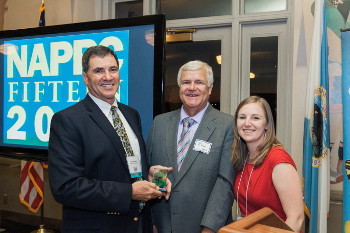
Back in the early 80s Don started doing something revolutionary and he hasn’t stopped. Pinelands Nursery & Supply started growing, selling, and distributing native plants to gardeners and for restoration programs throughout the Mid Atlantic. Going native seems commonplace today, but that wasn’t always the case. Don’s dedication to research and outreach showcasing the role that native plants could play in ecosystem restoration has helped create countless acres of pollinator habitat. We are excited to see those flowers continue to grow Don!
David Ainslie - Golderod Farms
NAPPC FARMER-RANCHER CANADA 2015
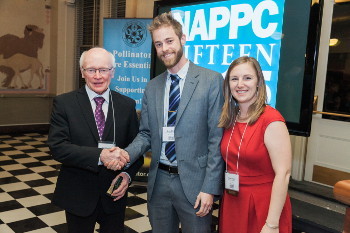
A veteran of pollinator conservation before it was popular David has been working to restore natural biodiversity and pollinator populations on his farm for over 30 years. His beautiful, and now famous, Carolinian woodlot is the flagship of this conservation work, right next to his extensive corn and soy operation, showcasing how farming and ecosystem stewardship need not be mutually exclusive. Davis wasn’t born a farmer, he chose this vocation later in life showing us all that you can get back to your roots and shoots. Thanks for choosing to farm for us and for the bees David!
erca.org/40conservation-champions/david-ainslie/
Congressman Jeff Denham - 10th District, California
SPECIAL POLLINATOR ADVOCATE NAPPC 2015
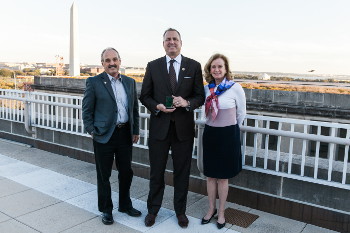
Special Pollinator Advocate awards are just that – special. In today’s world of partisan politics consensus support across party lines is becoming an endangered species. We would like to honor the dedication of Congressman Jeff Denham for his service on the Congressional Pollinator Protection Caucus and his leadership role in forwarding pollinator conservation efforts both federally and locally in his home state of California. Congressman Denham’s role on the Natural Resources and Agriculture committee keeps him connected to supporting the bees that help bring food to our tables. Thank you for a job well-done Congressman Denham!
denham.house.gov/issue/agriculture
2014 POLLINATOR AWARDS WINNERS
Sam and Heidi Heikes: Heikes Family Farm
NAPPC FARMER-RANCHER USA 2014
The NAPPC-NACD Farmer-Rancher Pollinator Award recognizes individuals who have contributed significantly to pollinator protection, conservation, and issue outreach resulting in increased awareness of the importance of pollinators and pollination within the agricultural community. This special award sheds light on the contributions of American farmers to natural and cultural resource preservation.
Sam Heikes and his daughter Heidi have been farming land that has been in their family since the 1900’s with a suitable model that puts the science of crop manage first. Sam Heikes has always worked with techniques that were developed through science and understanding of ecosystem functions and the way in which economics can make or break diversified farming systems. Sam’s motivation to support sustainable agriculture in the plains all started with sunflowers. Trained as an agronomist, Sam knew how to design cropping systems that were resilient to pests, produced high yields, and provided other ecological benefits. Within the wheat fields of South Dakota, efforts to improve crop yields and reduce pest infestations were being hampered by government programs that imposed production limits and crop restrictions. Sunflowers benefit wheat in many ways, and planting sunflowers after a wheat harvest would provide soil benefits and food to beneficial species like bees. Sam’s work with colleague Don Leiblow help to remove these restrictions was successful, and now South Dakota is the number one sunflower producer in the US – and sunflowers are helping to feed the bees by providing a pollen source.
Read the full Press Release here.
Micheal, Laura, and Takota Coen: Alberta Forest Farmers
NAPPC FARMER-RANCHER CANADA 2014
The NAPPC-NACD Farmer-Rancher Pollinator Award recognizes individuals who have contributed significantly to pollinator protection, conservation, and issue outreach resulting in increased awareness of the importance of pollinators and pollination within the agricultural community. This special award sheds light on the contributions of American farmers to natural and cultural resource preservation.
Sam Heikes and his daughter Heidi have been farming land that has been in their family since the 1900’s with a suitable model that puts the science of crop manage first. Sam Heikes has always worked with techniques that were developed through science and understanding of ecosystem functions and the way in which economics can make or break diversified farming systems. Sam’s motivation to support sustainable agriculture in the plains all started with sunflowers. Trained as an agronomist, Sam knew how to design cropping systems that were resilient to pests, produced high yields, and provided other ecological benefits. Within the wheat fields of South Dakota, efforts to improve crop yields and reduce pest infestations were being hampered by government programs that imposed production limits and crop restrictions. Sunflowers benefit wheat in many ways, and planting sunflowers after a wheat harvest would provide soil benefits and food to beneficial species like bees. Sam’s work with colleague Don Leiblow help to remove these restrictions was successful, and now South Dakota is the number one sunflower producer in the US – and sunflowers are helping to feed the bees by providing a pollen source.
Read the full Press Release here.
American Bee Project
NAPPC POLLINATOR ADVOCATE USA 2014
When it comes to pollination one often thinks of the excitement of the journey out to California to pollinate almonds in February – nearly 70% of US bees make it out there each year. A beekeeper’s work is often summarized as a mission to place bees from one crop to the next. BUT the real work and the incredible effort of beekeepers that provide pollination services (known in the industry as Pollinators) is to keep the bees going the rest of the year. Honey bees require proper nutrition gained through a diverse and abundant diet of mixed flowers and crops to be healthy – and they need this sort of food throughout the year. When bees aren’t in pollination contracts beekeepers want to place them in areas of ample, clean (pesticide and chemical-free) forage. Unfortunately these areas aren’t always present, and when they are they aren’t always available to the bees. As with native and wild bees, a lack of habitat is the leading factor impacting the health and viability of honey bees.
Read the full Press Release here.
Sustaible.TO Architecture + Building
NAPPC POLLINATOR ADVOCATE CANADA 2014
The Pollinator Advocate Award recognizes individuals who have contributed significantly to pollinator protection, conservation, and issue outreach resulting in increased awareness of the importance of pollinators and pollination. This year Sustaible.TO Architecture + Building is the distinguished recipient of the Pollinator Advocate Award for Canada for helping to give bees in need which need a place to rest indeed.
The loss of habitat is the main driving factor in pollinator decline, but lost habitat can be replaced by planting for pollinators and by building homes for bees. Flowers are just one part of the habitat equation for bees – a place to raise a family the other. In urban areas many of the natural places that bees might nest are unavailable, concrete covers soil, woodlots are cleared, and bees lack places to make their homes. Sustainable.TO heard the call to action and switched roles from human architect to bee developer, built five splendid bee condos that debuted across the GTA in June. Architects and interns learned how to think like a bee and put pollination biology in first place when developing these fashionable but functional designs. The flagship bee condo on the roof of the Fairmont Hotel in Toronto has drawn many visitors and helps spread the word on helping the bees.
Read the full Press Release here.
Dr. Pablo Jaramillo
NAPPC POLLINATOR ADVOCATE MEXICO 2014
Pablo Jaramillo has seeded the soil for successful monarch conservation in Mexico. For this reason he has been honoured as the recipient of the 2014 Pollinator Advocate Award for Mexico. Dr. Jaramillo’s work protects monarch from the base of their habitat – the soil that sustains the trees which provide overwintering habitat for hundreds of thousands of butterflies in the Oyamel Fir Forests of Mexico.
Dr. Jaramillo works with local community members through the Monarch Butterfly Fund to protect and preserve monarch habitats by ensuring the viability of communities and ecosystems surrounding these forests. Rather than erecting barriers and preventing locals from interacting with the landscapes that support monarchs, Dr. Jaramillo works with local to support the natural function of the forest. He works with the community to transform marginal agricultural land back into productive forest using mini-grants. To his credit, more than 30 hectares of forest have begun to regenerate to monarch habitat – quite a feat when only 0.67 hectares (1.65 acres) were occupied by monarchs last year during the lowest migration numbers yet.
Read the full Press Release here.
2013 POLLINATOR AWARDS WINNERS
Bryan and Cathy Gilvesy: Y U Ranch, Tilsonburg ON
NAPPC FARMER-RANCHER CANADA 2013
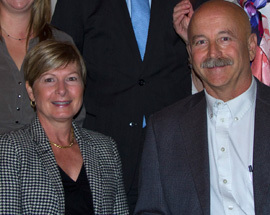
The Canadian Farmer-Rancher Pollinator Award recognizes individuals who have contributed significantly to pollinator protection, conservation, and issue outreach resulting in increased awareness of the importance of pollinators and pollination within the agricultural community. This special award is co-sponsored by Pollinator Partnership Canada and the Canadian Federation for Agriculture.
Bryan Gilvesy, and his wife Cathy, started farming tobacco in Norfolk County in 1979. A declining tobacco market signaled the move to cattle ranching. They have been raising Texas Longhorns for over fifteen years. A sustainable land ethic always governed their operation, but in 2008 Bryan attended a Pollination Guelph symposium where they learned about the importance of providing pollinator habitat on farms and other areas. That year, they put in a 2000 ft pollinator hedgerow and bee nesting habitat. Beef doesn’t require pollination, but the additional on-site and off-site benefits and ecosystem services provided by bees, butterflies, moths, and beetles, improve the local ecology. Things just seem to run better, and this translates into food that just tastes and feels better.
Josiah and Valer Austin: El Coronado Ranch and Cuenca de los Ojos
NAPPC FARMER-RANCHER USA 2013
The NAPPC-NACD Farmer-Rancher Pollinator Award recognizes individuals who have contributed significantly to pollinator protection, conservation, and issue outreach resulting in increased awareness of the importance of pollinators and pollination within the agricultural community. This special and new award, presented for the first time this year, sheds light on the contributions of American farmers to natural and cultural resource preservation.
Pollinators are high on the radar for Josiah and Valer Austin who have been farming and ranching for pollinators for over a decade. The Austin’s are working toward sustainable models of conservation and productivity in cattle production with managed grazing. Their goal is to promote sustainable ranching both in the United States and Mexico, ranching that feeds the industry and supports local ecosystems. When managed correctly, reduced grazing can have dramatic positive effects on the diversity of pollinators. The Austin’s have promoted their pollinator grazing system on their properties in Arizona, Texas, Montana, and Northern Mexico, where they also encourage pollinators by planting pollinator-attractive vegetation and increasing nesting habitat. Their participation in monitoring and documenting the diversity of pollinators on their properties has established a valuable baseline for pollinator dynamics in semi-natural environments.
Alderville First Nation
NAPPC POLLINATOR ADVOCATE CANADA 2013
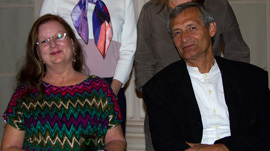
Pollinators support local ecosystems, and these ecosystems support our culture. Living apart from nature often makes us forget that they way we speak, the foods we eat, the art we produce, and the culture we have came to us from our natural surrounding. This fundament fact is at the root of the cultural and landscape preservation carried out by the Alderville First Nation Black Oak Savanna. A simple action back in 2002, the seeding of crop land with native species, has returned and revived not only a local landscape but an ecosystem. Today it flourishes with partnerships: plants and people, plants and pollinators. Sharing the landscape and working together to support community is embodied in this program.
Virginia Webb
NAPPC POLLINATOR ADVOCATE USA 2013

Pollinators support local ecosystems, and these ecosystems support our culture. Living apart from nature often makes us forget that they way we speak, the foods we eat, the art we produce, and the culture we have came to us from our natural surrounding. This fundament fact is at the root of the cultural and landscape preservation carried out by the Alderville First Nation Black Oak Savanna. A simple action back in 2002, the seeding of crop land with native species, has returned and revived not only a local landscape but an ecosystem. Today it flourishes with partnerships: plants and people, plants and pollinators. Sharing the landscape and working together to support community is embodied in this program.
Roque Arroyo Rodríguez
NAPPC POLLINATOR ADVOCATE MEXICO 2013

Roque Arroyo Rodríguez has rediscovered the lost art of keeping stingless bees and is playing a key role in their local conservation in Puebla, Mexico. The traditional practice of stingless beekeeping, or meliponiculture, dates back to Mayan times, but has significantly declined over the past few decades and is a cultural aspect that is at risk of disappearing. Stingless bees produce sweet, light honey from native forest plant species. Their honey is valued both nutritionally and medicinally and can provide a viable income source to stingless beekeepers. In 2006 Roque Arroyo Rodríguez develop a local stingless beekeeping cooperative, Texochco Sentekitini, in Sierra Norte de Puebla, México. The Texochco Sentekitini cooperative has twelve members that keep bees, and has grown so much that contract pollination services can be provided to growers of local fruits. This all generates income that can support families and the community. Roque and Texochco Sentekitini are proving the value of pollinator conservation and management in Mexico.
Louie Schwartzberg: Wings of Life
NAPPC PAUL GROWALD MEDIA AWARD 2013
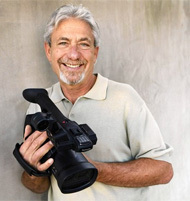
In 2011, Director Louie Schwartzberg composed a beautiful love story that is in danger. Pollinators and plants have evolved over millions of years to be codependent. Our future depends on this love story between the flowers and pollinators because more than 90% of our food wouldn’t make it to our plate without them and nearly every terrestrial landscape would senesce. In Wings of Life, Louie Schwartzberg presented this message of our total dependence on pollinators with splendor and grace. Audiences were stunned by the beauty and came away with a deeper understanding of why we need to protect these natural resources. The Paul Growald Media Award is a special award that is not presented every year. Pollinator Partnership awards this honor only when a Pollinator Advocate uses power of media to support pollinators. Wings of Life is a true representation of how powerful a deeper look at plants and their pollinators can, acting as a global call to action for their conservation.
2012 POLLINATOR AWARD WINNERS
Carol Dunk, Master Gardener
NAPPC POLLINATOR ADVOCATE CANADA 2012
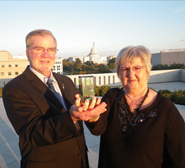
Carol Dunk began putting wildflowers in unusual places to make trips along the highway a little more appealing, and from that Roadsides was born. The first Pollinator Patch was planted by Carol and others in her hometown of Barrie, Ontario, in May of 2010, and serves as an example of what can be done by a small group of volunteers. This small step pollinated a network of roadside plantings that are transforming the transportation corridors of Southern Ontario.
Click here to read more about her and the press release
Rodrigo Medellin, Ph.D.
NAPPC POLLINATOR ADVOCATE MEXICO 2012
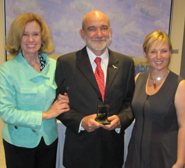
Heads the Program for the Conservation of Migratory Bats, a partnership between the Institute of Ecology, Universidad Nacional Autonoma de Mexico, BIOCONCIENCIA, and EcoHealth Alliance.
Like the inaudible chirps and clicks of the bat, the desperate need to protect these animals often goes unnoticed. For more then 25 years Dr. Rodrigo Medellin has been working to change that. As we mark the International Year of the Bat we celebrate Dr. Medellin’s career and commitment to the flying mammal that helps cactus fruit, controls insect populations, and fills cultural mythology.During his career Dr. Medellin founded and today heads the Program for the Conservation of Migratory Bats, a partnership between the Institute of Ecology, Universidad Nacional Autonoma de Mexico, BIOCONCIENCIA, and EcoHealth Alliance.
Click here to read more about him and the press release.
Isabella Rossellini, Actress
NAPPC POLLINATOR ADVOCATE USA 2012

Isabella Rossellini is receiving the honor for her short-film series advocacy campaign enlightened the life of bees and their struggles to survive. In 2012 Ms Rossellini released a series of short films in partnership with Burt’s Bees using social media as a vector for pollinator education. The voluptuous sovereign life of the Queen bee; the energetic and feisty lives of the work-bee sisters; the gluttonous and indulgent short life of the drone all captivated viewers.
Click here to read more about her and the press release.
Don Ruzicka, Farmer
NAPPC FARMER-RANCHER CANADA 2012
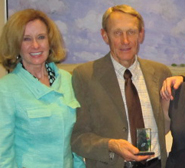
The Ruzicka’s have been practicing sustainable farming since the mid 90’s, long before organic agriculture and ecologically functional farmscapes were popularized. Pollinators became a solid part of their conservation focus when cases of CCD started appearing south of the boarder in the United Sates and they became aware of the critical roles that pollinators play in agricultural systems. This plugged Don and Marie into the connection that all members of the agricultural community have with pollinators.
Click here to read more about him and the press release.
Mark Wagonor, Farmer
NAPPC FARMER-RANCHER USA 2012
Mark Wagoner is a fourth generation farmer whose crops include alfalfa and the native solitary alkali bee, Nomia melanderi. Mark practices a unique style of holistic farming where care for the land brings in native pollinators to native crops. Sticking to his roots and making innovation out of tradition has made Wagoner Touchet Farms a place where native bees and production agriculture coexist.
Click here to read more about him and the press release.
2011 POLLINATOR AWARD WINNERS
Dra. M. Isabel Ramirez, Monarch Butterfly Fund Mexico
NAPPC POLLINATOR ADVOCATE MEXICO 2011
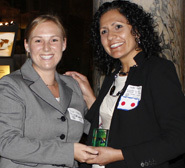
For over a decade Dra. Isabel Ramirez has been supporting an epic migration that spans a continent. Dra. Ramirez has taken a lead role in promoting and protecting critical overwintering habitat for monarch butterflies in Mexico. Her work with local citizens has preserved habitat and has given both the monarch butterflies and the community a second chance. Dra. Ramirez’s conservation action is supported by her research into how local land use change impacts the local climate at the Monarch Butterfly Reserve in Mexico.
Clement Kent, Ph.D.: HSPT Pollinator Gardens Project
NAPPC POLLINATOR ADVOCATE CANADA 2011
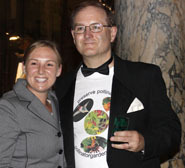
Dr. Kent founded the Pollinator Gardens Project to educate gardeners and the public about how they could help create and conserve habitat for these important species using native plants. This past year Dr. Kent envisioned and designed an indoor pollinator garden that was on display at “Canada Blooms”, the largest Garden Show in Canada, showing just how motivated he is for this cause. Dr. Kent’s demonstration pollinator gardens have been seen by thousands of people and have sparked interest in garden and beekeeping groups in other cities that want to create their own pollinator gardens.
Pete and Laura Berthelsen
NAPPC POLLINATOR ADVOCATE USA 2011
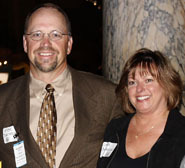
Peter and Laura Berthelsen have taken steps to help pollinators on their land in Elba, Nebraska, creating not only habitat but also an outdoor education classroom where people from across the state can see firsthand just how important pollinator habitat is. As a result, many other landowners have begun planting pollinator habitat on their own property. Peter also helped secure many of the pollinator planting guidelines present in new Conservation Reserve Program across the United States, doing significant work in Washington DC to ensure that polliatnors remain a key concern for conservation programming. To this end Peter has served as a speaker at meetings across the country to help educate stakeholders and decision-makers about the importance of pollinators and pollinator habitat, working to help them use and implement Farm Bill provisions to better the landscape for pollinators.
Jimmy Brown: Energy United
NAPPC POLLINATOR ADVOCATE USA 2011
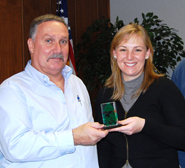
Jimmy Brown has worked to incorporate pollinator habitat development into the management practices of Energy United utility holdings in North Carolina, creating a network of potential pollinator habitat spanning more than 1000 miles. Brown and his staff have worked to educate their industry partners, stressing the importance of protecting and promoting the natural habitats for pollinators that run underneath overhead transmission wires and the positive impact that these small actions can have. Together Brown and his team are providing the community with an essential service, providing pollinators with essential habitat, and changing industry.
Frances Jansen, Toyota Motor Manufacturing, Kentucky, Inc.
TOYOTA MOTOR ENGINEERING & MANUFACTURING NORTH AMERICA, INC
NAPPC/WHC POLLINATOR ADVOCATE 2011
Georgetown Site-Toyota of Georgetown were avid participants in National Pollinator Week. They showcased their 62 acres of land managed appropriately for pollinators by hosting a full week of educational pollinator-themed events for all ages.
2010 POLLINATOR AWARD WINNERS
Sabrina Malach
NAPPC POLLINATOR ADVOCATE CANADA 2010

Ms. Malach was the driving force behind the first ever Canadian Pollinator Week celebrated July 21 to July 26, 2010 across the city of Toronto. Pollinator Week activities included public lectures by Dr. Lawrence Parker, a global expert on bees; artistic instillations highlighting pollinator species; and guided pollinator safari tours in the Brickworks park lands. Visitors to the event took away more then just an appreciation for pollinators in the city – the learnt how they could become partners in a growing effort to conserve pollinating species in landscapes across North America. Ms. Malach is already working on plans for Pollinator Week 2011.
Press Release for Sabrina Malach
Musée de l’abeille
NAPPC POLLINATOR ADVOCATE CANADA 2010

For the past 20 years, the Musée de l’abeille has been delighting and educating visitors on the importance of honey bees in our daily lives, in the livelihoods of our farmers, and in our local economies. This local institution has developed exhibits and tours that reach every age group. A unique element of the Musée de l’abeille is the focus on the economy of honey and honey products that lets visitors know just how connected they are to the work of bees. With over 25,000 visits a year, the Musée de l’abeille is making an impression on young and old.
Press Release for Musee Abeille
Tammy Horn, Ph.D.
NAPPC POLLINATOR ADVOCATE USA 2010

Dr. Horn has worked for years with honey bees and has been a true advocate of their conservation and protection. Her recent efforts in Appalachian coal country with apiforestation has gained her this recognition. Dr. Horn has been able to work across disciplines and has brought together multiple stakeholders that often have divergent interests, all for the sake of honey bees. The practice of reclaiming coal mine lands by planting trees, shrubs and other vegetation and establishing healthy working “beeyards” is now in place and strong partnerships have been developed between unlikely parties.
Humberto Berlanga
NAPPC POLLINATOR ADVOCATE MEXICO 2010

Mr. Berlanga has achieved ineradicable results in avian conservation within Mexico and for the first time has coordination national and international efforts for the conservation of important avian species and their habitats. Migratory pollinators that travel between Mexico and the United States and Canada have been a big focus of Mr. Berlanga. His work has set up monitoring and observation station along important migratory routes that will collect valuable data for future conservation and habitat protection.
Press Release for Humberto Berlanga
Alcee L. Hasting, U.S. House of Representatives
NAPPC POLLINATOR ADVOCATE USA 2010

Representative Hastings has been a strong pollinator advocate and a true conservation leader, achieving the first-ever pollinator-specific provisions in the 2008 Farm Bill, which led to pollinator-beneficial initiatives in major conservation programs and research funding. In addition, Hastings has increased baseline funding for USDA, ARS pollinator research and for ongoing pollinator initiatives and funding in the USDA, NIFA competitive grants program. A lead voice in increasing pollinator awareness, Hastings co-chaired and co-founded the first-ever bipartisan Congressional Pollinator Protection Caucus (CP2C) in 2010, and has been a strong supporter of local Pollinator Week activities in his home state of Florida. Representative Hastings has worked to provide researchers and land managers with the tools to protect and promote a valuable and irreplaceable natural resource.
Press Release for Alcee Hastings
Paul Kaiser, Singing Frogs Farm
NAPPC/NACD FARMER-RANCHER USA 2010

Paul Kaiser and Singing Frogs Farm are leading by example. They have made a concerted commitment to providing safe pollinator habitat, are turning their consumers and other producers on to pollinators and pollinator conservation. Singing Frogs Farm is a certified Bee Friendly Farming™ (BFF) operation, signifying that the operation meets or exceeds minimum criteria for providing adequate habitat for bees and other pollinators and using bee-beneficial practices. Farm tours and open houses hosted by Paul and his family continuously bring visitors onto his land and help to spread the word about the role that pollinators play in agriculture and the actions that are necessary to protect and support them. Thus, Singing Frogs Farm produces more than food – they grow consumer consciousness and environmental stewardship.
Lori Caso, Model City Facility
WASTE MANAGEMENT, INC.
NAPPC/WHC POLLINATOR ADVOCATE 2010
Waste Management of Model City, New York planted their own pollinator garden on a Hazardous Waste Transfer Storage Disposal Facility. Along with hosting an open house to showcase the importance of pollinators to their local community, Waste Management is also engaging in citizen science through monitoring their garden for different pollinator species and working with local beekeepers. After seeing the success of the first pollinator garden, another was planted at a local nursing home.
WHC Pollinator Friendly Practices Award PowerPoint
Changing the Corporate Aesthetic PowerPoint
2009 POLLINATOR AWARD WINNERS
Juan Francisco Ornelas, Ph.D: Instituto de Ecología A.C.
NAPPC POLLINATOR ADVOCATE MEXICO 2009
Homer Woodward, Jasper Wyman and Son
NAPPC POLLINATOR ADVOCATE CANADA 2009
Sam Earnshaw: Community Alliance with Family Farmers
NAPPC POLLINATOR ADVOCATE USA 2009
Honorable Earl Blumenauer, U.S. House of Representatives
NAPPC POLLINATOR ADVOCATE USA 2009
James Anthony "Tony" Thompson
NAPPC/NACD FARMER-RANCHER USA 2009
Joseph W. Eades, Creve Coeur World Headquarters
MONSANTO COMPANY
NAPPC/WHC POLLINATOR ADVOCATE 2009
Monsanto Company’s Wildlife Habitat Committee has shown stewardship and foresight through actively managing ten acres at their headquarter site for native prairie habitat, including a “Native Wildflower Garden.” This prairie habitat includes many high nectar and pollen yielding forbs beneficial to pollinators. They have also added “bee blocks” to provide nesting sites for bees, eradicated the invasive bush honeysuckle plant, and undertaken controlled burns in order to naturally encourage native plant diversity and overall prairie health. They have also undertaken monitoring of the area by conducting season surveys of insects, including pollinators and not applied any pesticides.
2008 POLLINATOR AWARD WINNERS
José Sarakhan, Ph. D. UNAM
NAPPC POLLINATOR ADVOCATE MEXICO 2008
Kevin Carver: Prince Edward Island
NAPPC POLLINATOR ADVOCATE CANADA 2008
Dave White: NRCS – Montana State Conservationist
NAPPC POLLINATOR ADVOCATE USA 2008
Chuck Hurd, Lister Acres
NAPPC/NACD FARMER-RANCHERS USA 2008
Brad Eisenhart, Twin Bridges Landfill, Indiana
WASTE MANAGEMENT, INC.
NAPPCY/WHC POLLINATOR ADVOCATE 2008
Waste Management manages a 340 acre property, some of it situated on top of a landfill, as migration and breeding habitat for more than 20 endangered, threatened, special concern bird species. Through these practices, Waste Management has created beneficial pollinator habitat as well. The establishment of an apiary program in 2001 has served to enhance the ecological value of the site, and now produces more than 200 lbs of honey annually. Eradication of invasive and re-establishment of native coastal plant species have contributed to considerable presence of pollinators on the site. Waste Management has also reached out to local schools who visit the site to learn about wildlife habitat and the importance of pollinators.
2007 POLLINATOR AWARD WINNERS
José Ignacio Cuadriello Aguilar: Universidad de Guadalajara
NAPPC POLLINATOR ADVOCATE MEXICO 2007
Vicki Beard: City of Guelph, Ontario
NAPPC POLLINATOR ADVOCATE CANADA 2007
Jim Wiker, Illinois Natural History Survey
NAPPC POLLINATOR ADVOCATE USA 2007
Mike Omeg, Omeg Orchards
NAPPC/NACD FARMER-RANCHER USA 2007
Flint Creek Power Plant Southwestern Electric Power Company
AMERICAN ELECTRIC POWER
NAPPC/WHC POLLINATOR ADVOCATE 2007
Gentry, Arkansas-Flint Creek Power plant manages 200 acres for pollinators, and works with local 4H clubs and grades schools to plant Paw Paws to attract Zebra Swallowtails, as well as monitor the insects seen.
2006 POLLINATOR AWARD WINNERS
Jim Dyer, Environment Canada
NAPPC POLLINATOR ADVOCATE CANADA 2006
Francisco Molina, Ph.D.: National University of Mexico
NAPPC POLLINATOR ADVOCATE MEXICO 2006
Betsy Croker, Ph.D.: Senate Committee on Agriculture
NAPPC POLLINATOR ADVOCATE USA 2006
Vincent J. Tepedino, Ph.D.: USDA
NAPPC POLLINATOR ADVOCATE USA 2006
John Keeley
NAPPC/NACD FARMER-RANCHER USA 2006
Jonesboro Rice Mill, Busch Agricultural Resources, Inc.
ANHEUSER-BUSCH COMPANIES, INC.
NAPPC/WHC POLLINATOR ADVOCATE AWARD 2006
Jonesboro, Arkansas- The Jonesboro Rice Mill manages 12 acres for pollinators. They also introduced Monarch eggs to the site, along with a pollinator program for 2nd grade and preschool classes. During Pollinator Week, they educated the community by setting up display at the local post office to coincide with the release of the pollination stamp series.
2005 POLLINATOR AWARD WINNERS
Dale Bosworth, U.S. Forest Service
NAPPC POLLINATOR ADVOCATE USA 2005
Bruce Knight, USDA NRCS
NAPPC POLLINATOR ADVOCATE USA 2005
Ron Krystynak, Canadian Embassy
NAPPC POLLINATOR ADVOCATE CANADA 2005
Don Pedro Cahun Uh, Tihosuco
NAPPC POLLINATOR ADVOCATE MEXICO 2005
Freedom Plant, LaFarge North America, Inc.
DELEVAN, NEW YORK
NAPPC/WHC POLLINATOR ADVOCATE 2005
Lafarge manages 41 acres of wildlife habitat at their Freedom Plant site. Their habitat enhancement projects have reclaimed areas that were once mined but now consist of northern hardwood forests and emergent wetlands. These restoration projects have contributed greatly to the population of pollinators at the site.
2004 POLLINATOR AWARD WINNER
General Motors Corporation, Saginaw Malleable Iron Plant
NAPPC/WHC POLLINATOR ADVOCATE 2004
2003 POLLINATOR AWARD WINNER
Monroeville Technical Center, PPG Industries, Inc.
NACCP/WHC POLLINATOR ADVOCATE 2003
Cynthia Pratt Laughlin Medal by The Garden Club of America
2011
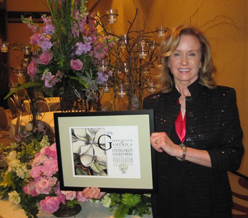
The Pollinator Partnership (P2) was presented the prestigious Cynthia Pratt Laughlin Medal by The Garden Club of America at its annual awards ceremony on April 30 in Indianapolis, Indiana. P2 is the twenty-second recipient of this national medal, awarded for “outstanding achievement in environmental protection and the maintenance of the quality of life.”
